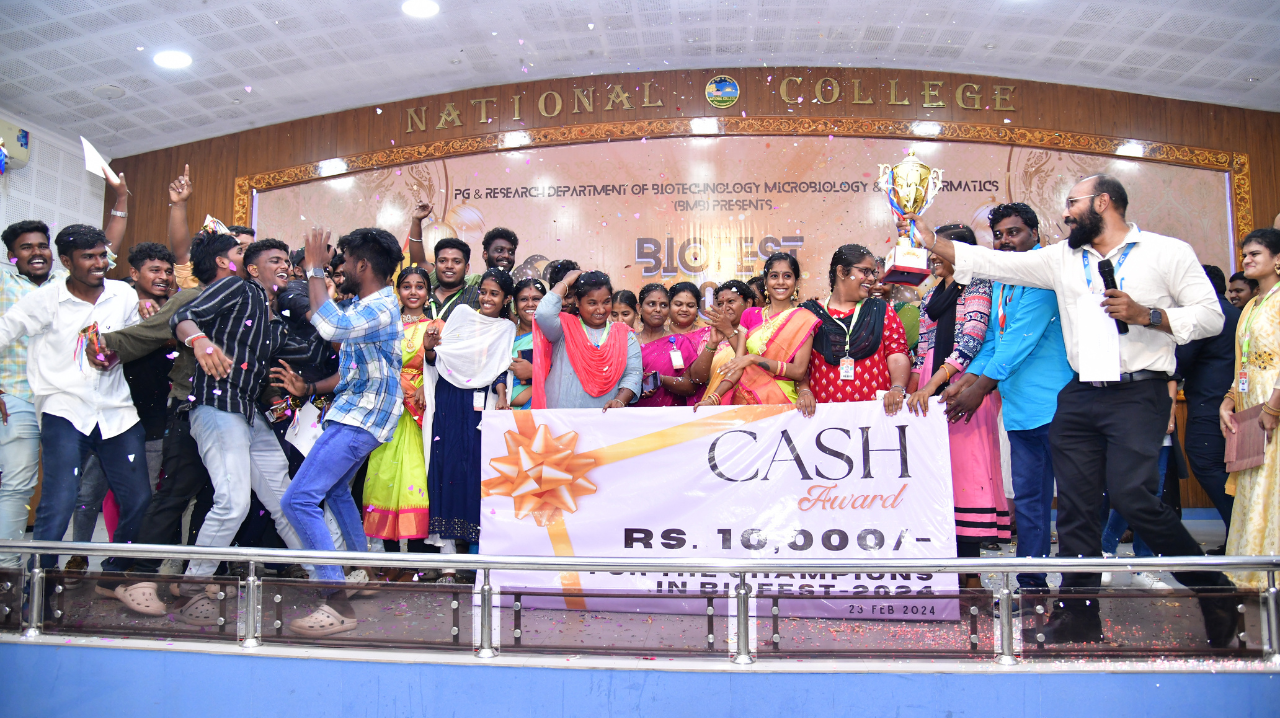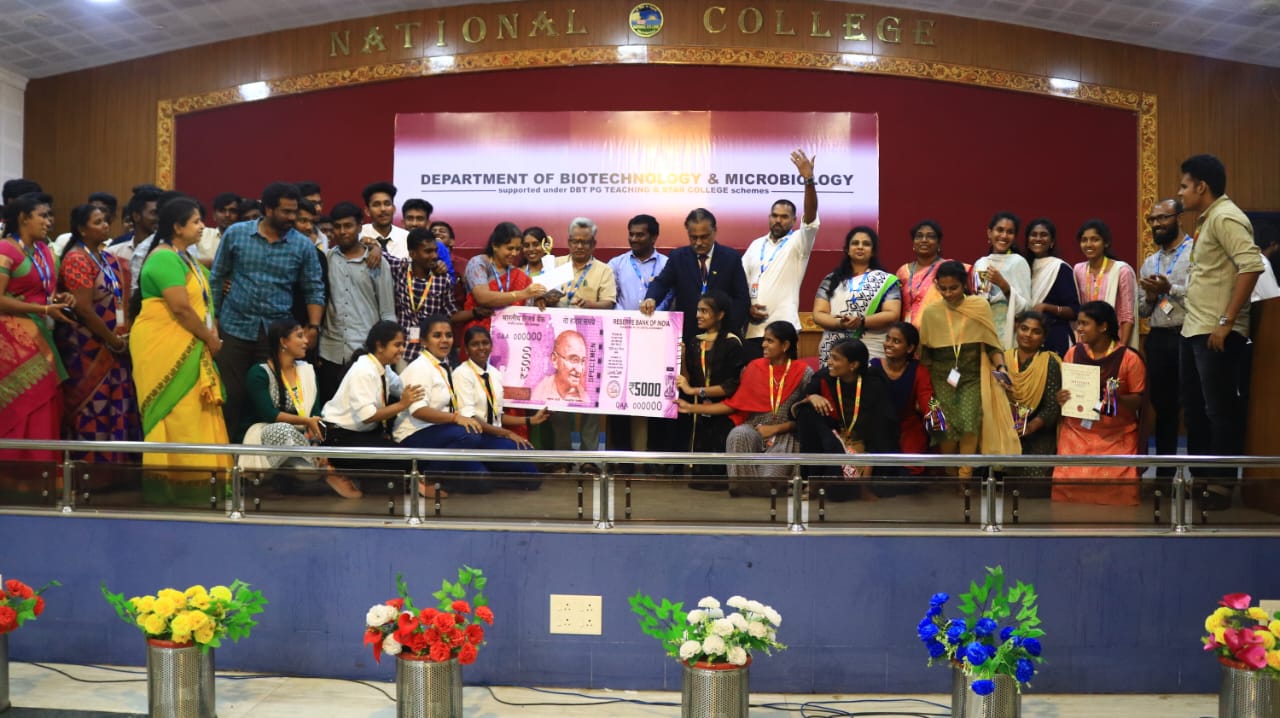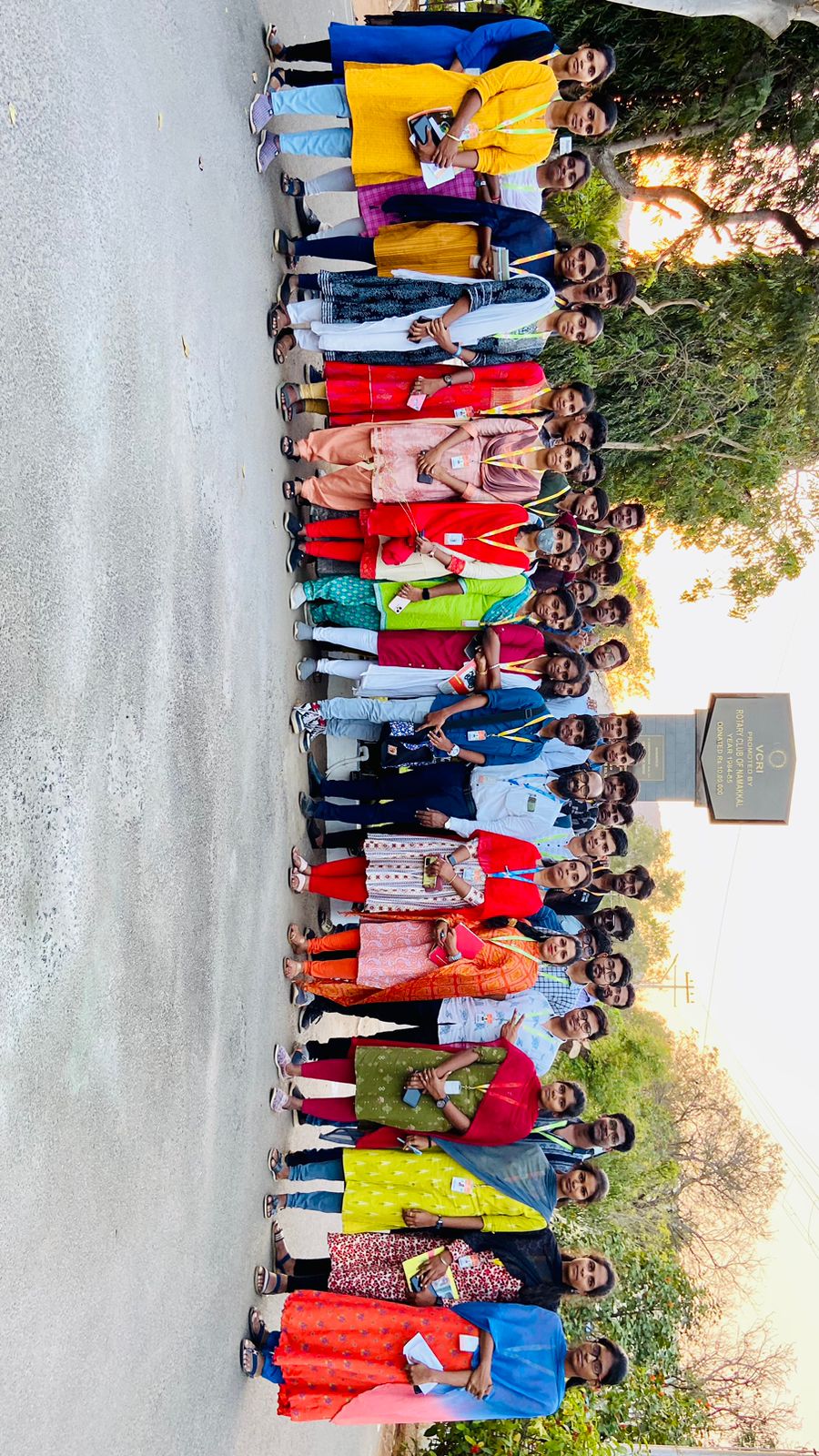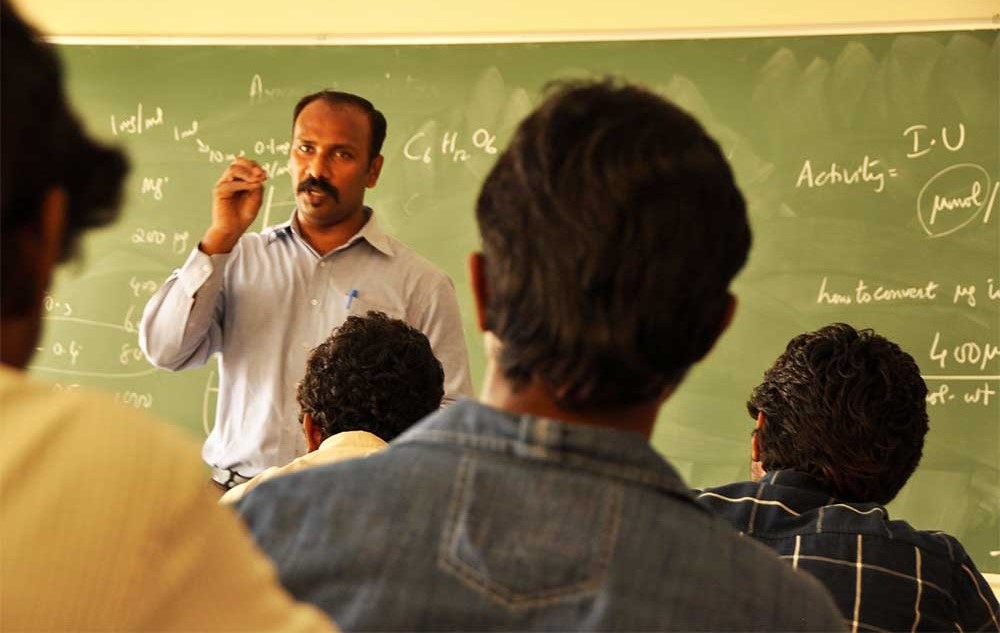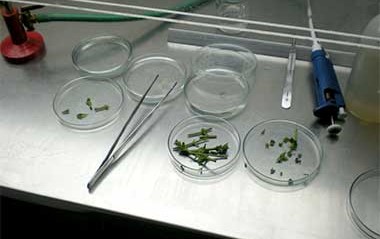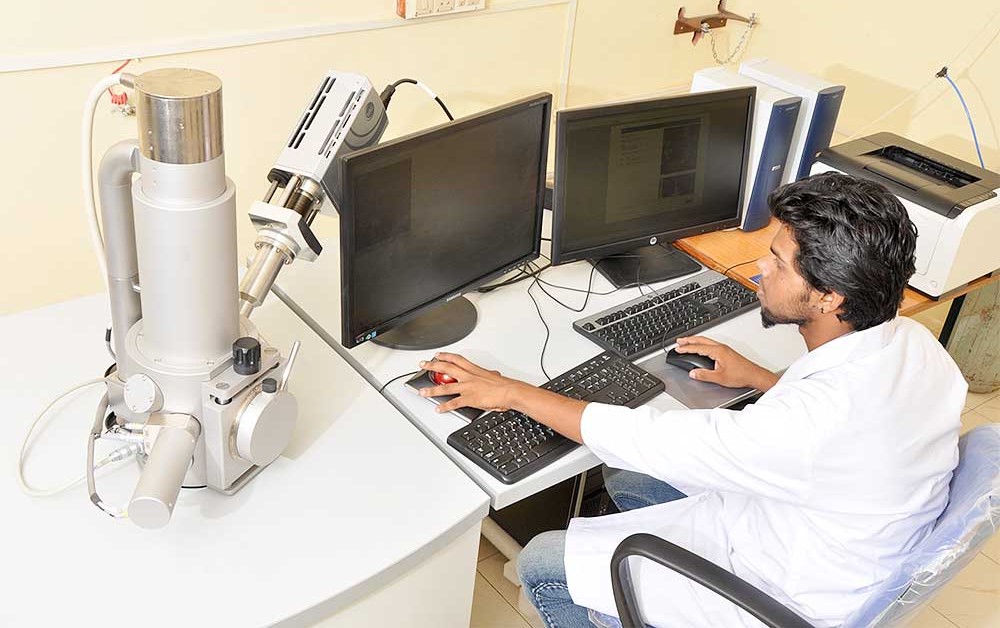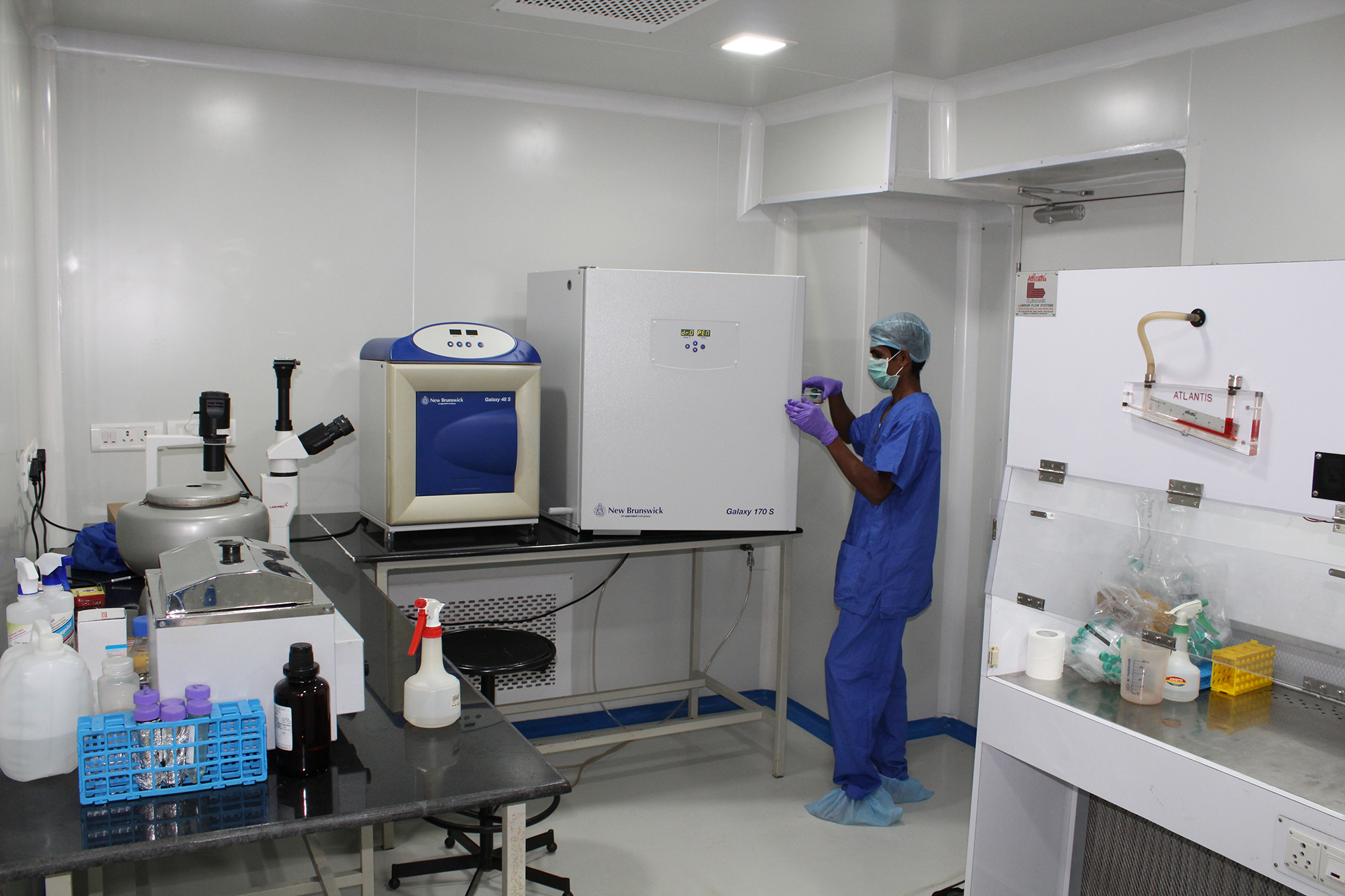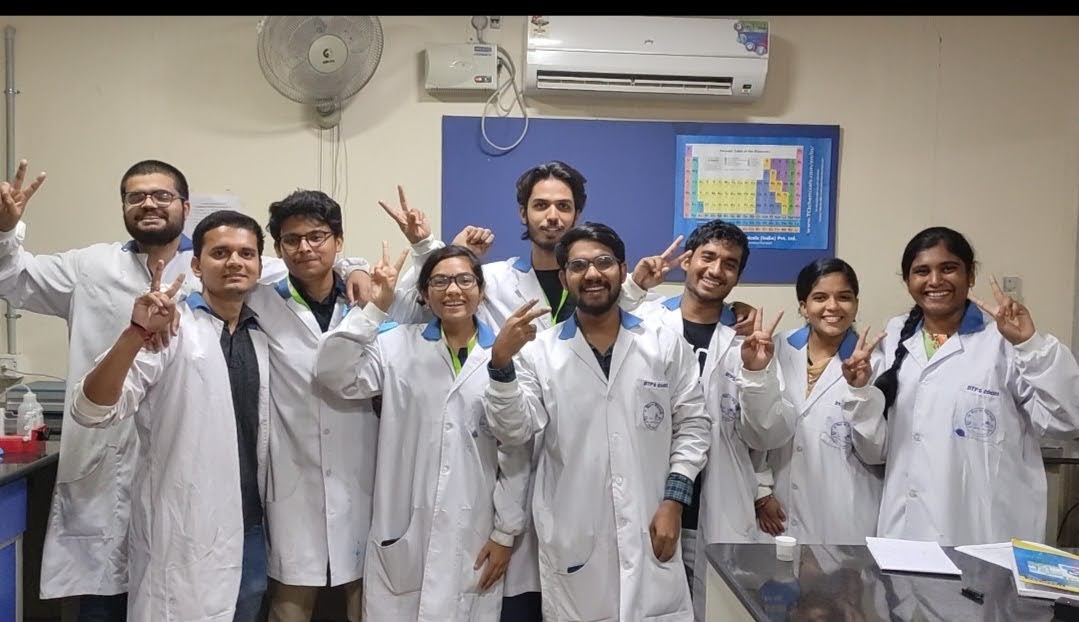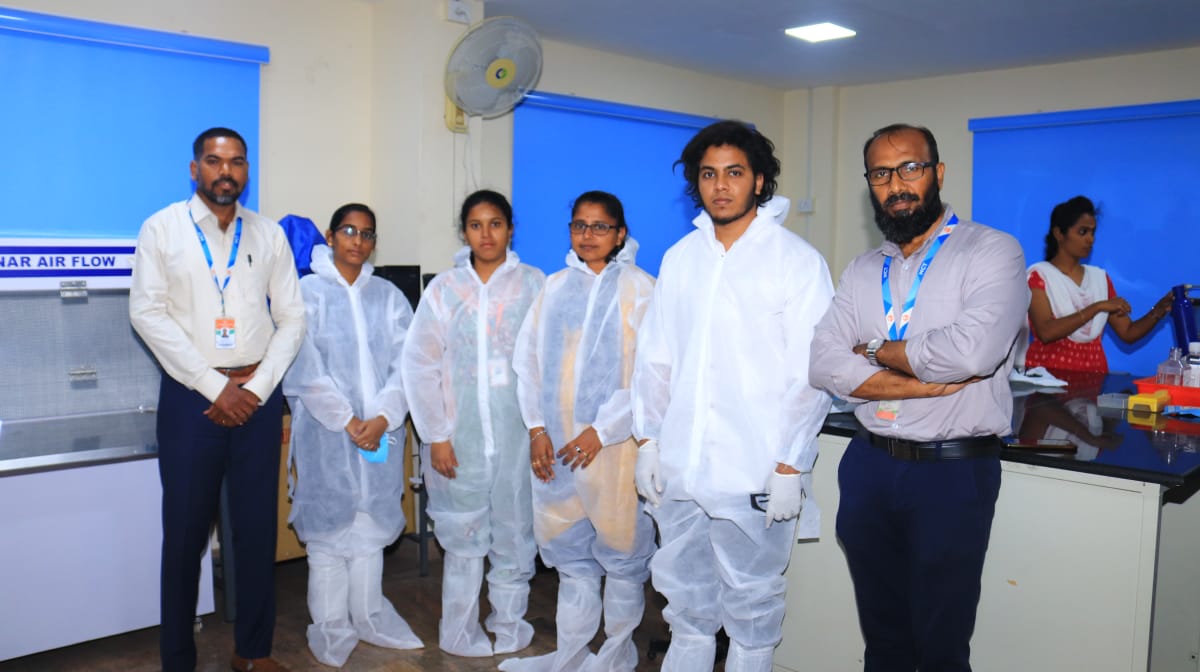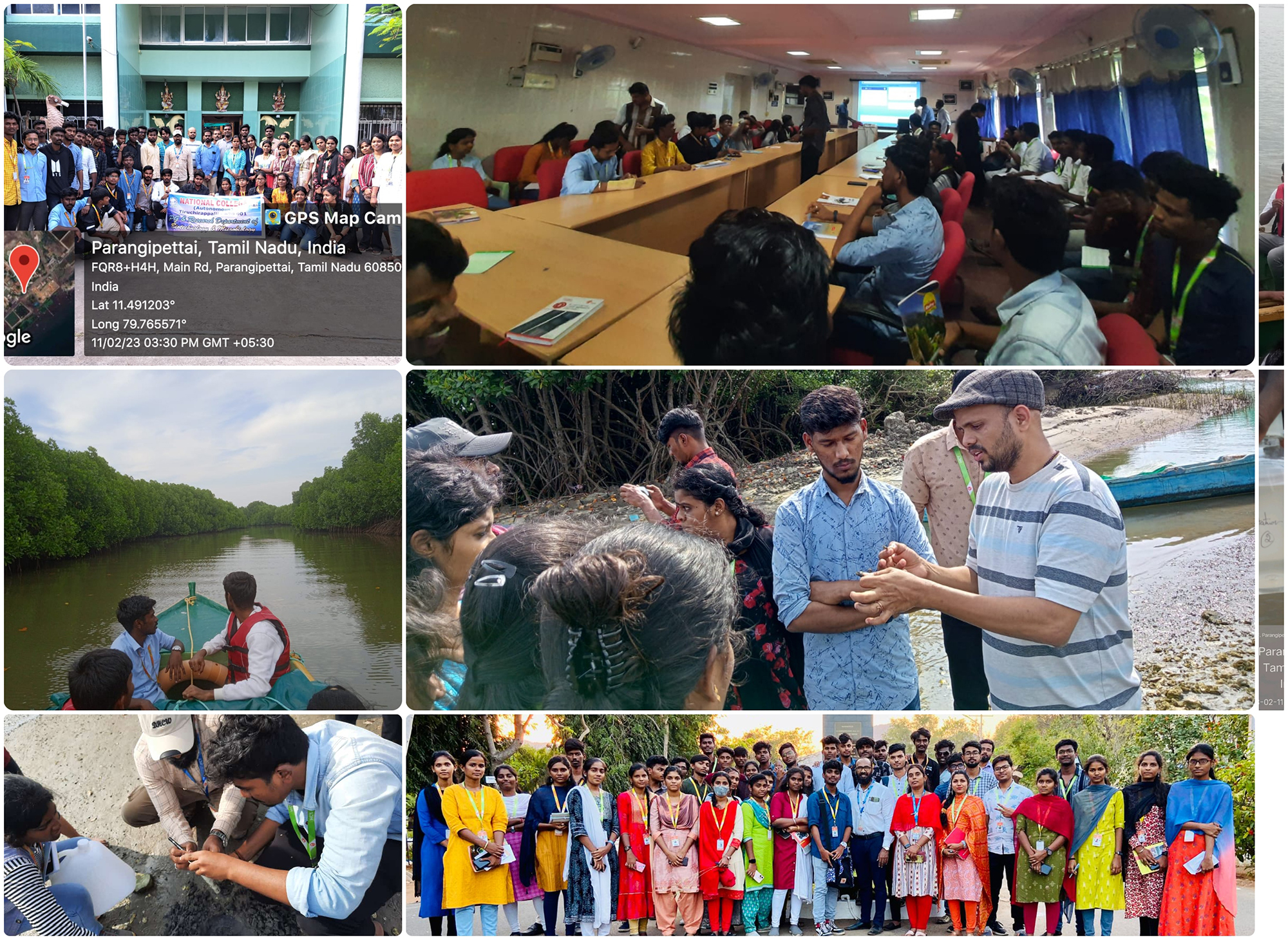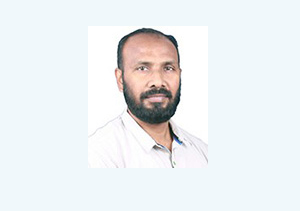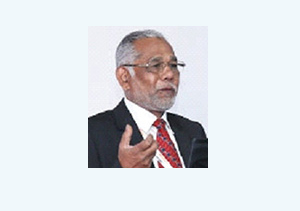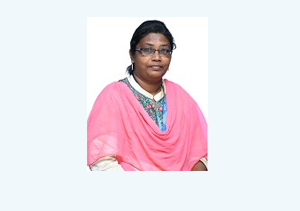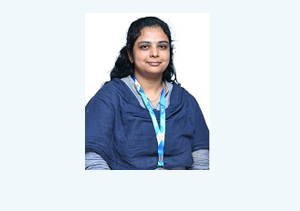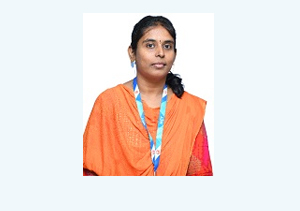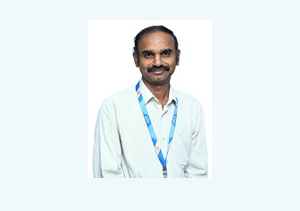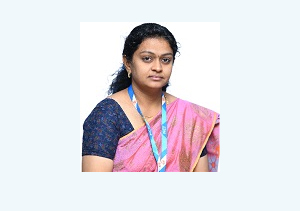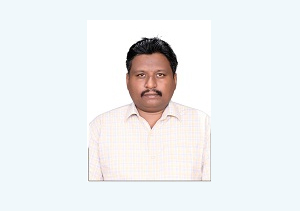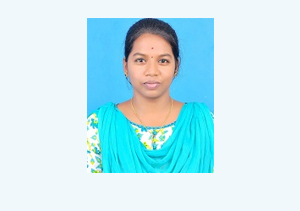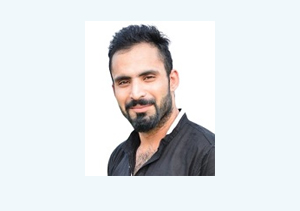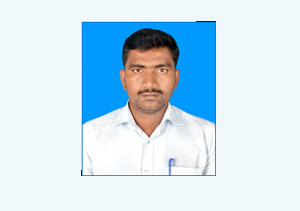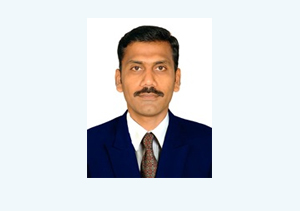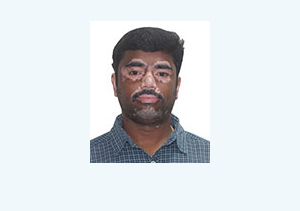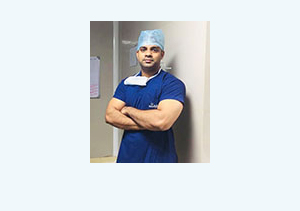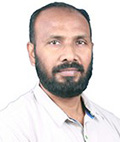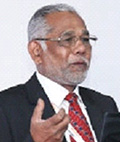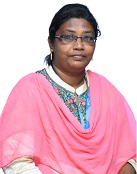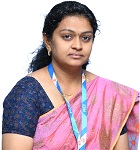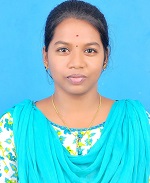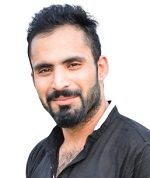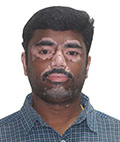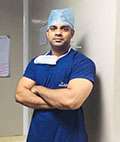Post Graduate and Research Department of Biotechnology, Microbiology and Bioinformatics (Supported by DBT-India, under PG Teaching Scheme)
- THE DEPARTMENT
- PROGRAMMES OFFERED
- DBT-SUPPORTED M.SC. BIOTECHNOLOGY
- CULTURE COLLECTION CENTRE
- FACULTY
- HYDRA RESEARCH FACILITY
- ANIMAL CELL CULTURE FACILITY
- PROJECT/INTERNSHIP
- EVENTS
- FEE STRUCTURE
- STUDENTS ACHIEVEMENTS
- ADMISSION PROCEDURE
- INTERNATIONAL STUDENTS
- MOU
- CAMPUS PLACEMENT
- FACILITIES
- RESEARCH PROJECTS
- STUDENT REFERENCE
- STUDENTS SAY
- SYLLABUS
THE DEPARTMENT
Department of Biotechnology, Microbiology & Bioinformatics
The history of biology traces the living world from ancient to modern times. Biological sciences such as Botany and Zoology became increasingly professional scientific disciplines from the beginning of the 18th century. With a better understanding of life forms and the fading of boundaries with technology that helped delve into the depth of molecular biology, today, these studies have become more focused and purposeful for application, benefiting mankind. Thus, Biotechnology and Microbiology are realized for their importance in the present times rooting from the basics of life forms such as plants, animals and microorganisms.
The Department of Biotechnology, National College (Autonomous), Tiruchirapalli, was established in 2011 with a firm objective to provide quality teaching and learning in the fields of modern science, focused on practical learning, leading to original research contributions of global standards. As proof of growth, the Department of Microbiology was initiated in the year 2013 to impart knowledge on the beneficial and malevolence impacts of microorganisms on society and later merged with the Department of Biotechnology. After a decade, today, the department offers UG and PG courses are offered in both disciplines, possesses the best possible infrastructure to nurture 250 students and hosting 14 faculty members.
The Department of Biotechnology and Microbiology in National College stands tall in reputation in terms of quality education, updated training and career guidance as it is recognized under DBT PG teaching & under the DBT star college scheme. The PG research and teaching departments have thus opened up lead research avenues for post-graduate and doctoral students in molecular oncology, genetic engineering, animal health, bioinformatics, data mining, plant and animal biotechnology, marine microbiology, freshwater microbiology, plant microbiology, and integrated research areas. The department has signed MoUs with the National Research Center for Banana (NRCB), Tiruchirappalli, Alagappa University, Karaikudi, Tamil Nadu, Kothari Sugars and Chemicals Limited, Tiruchirappalli, Tamil Nadu, Targenix private limited (Chennai), Fermentech GSV (Thanjavur), and Vivagen Lab Dx (Chennai), to impart and exchange academic and research outputs and training. The Biotechnology and Microbiology department thus provides state-of-the-art facilities for studies about plant tissue culture, animal cell/tissue culture, microbiological research, toxicology, cancer biology, aquaculture, metagenomics, and stem cells. Both the UG and PG students are given supervised access to the departmental labs 24x7 and are strongly encouraged to practice science. The National College Culture Collection Centre (N4C) was initiated in January 2022, which holds more than 220 microbial strains currently and are screened for various application potentials such as lipases and amylases, nano-particle synthesis, probiotic, and dye degradation activities.To add wings to its research vision, the department in the academic year 2020-2021 has attracted five additional faculty members with research and teaching expertise with International post-doctoral research experience in molecular oncology, neurotoxicology, animal health science, aquaculture, bioinformatics, agricultural/soil microbiology, aquatic biotechnology / biofuel and metabolic engineering.
A must read on Biotechnology in the Realm of HistoryBiotechnology or Microbiology or What big deal between?
Biotechnology and Microbiology are closely inter-related to each other in terms of the fundamentals and applications. Biotechnology includes many or most of the concepts and different laboratory techniques of Microbiology and similarly, Microbiology completely depends on the biotechnological methods. There are both common and uncommon areas of study and employment for Biotechnology and Microbiology in general. For an instance, common areas for Biotechnology and Microbiology include that of Fermentation, Bioinformatics, Molecular Biology, Diagnostics etc. while the two disciplines largely stay apart or differ in the aspects of Animal / Plant Biotechnology and its application areas such as Assisted Reproductive Technology (ART / IVF), Cell Culture based productions etc.
National College offers the best and practical exposure to the students both in Biotechnology and Microbiology in the common inter-twined facilities that are highly resourceful and vast. Be it, short term projects or internships or research collaborations, or advanced instrumentation, students of Biotechnology and Microbiology are given equal exposure and importance across disciplines in all the activities, building their confidence in curricular and extra-curricular activities. Team of faculty members with Post-Doctoral experience in India and Abroad having different research background / specializations in the fields of Biotechnology and Microbiology in the department at NCT, give the students winning edge in understanding the subjects and practical learning; leading to remarkable exposure favouring higher studies and placements
By its nature, Biotechnology that encompasses the domain of Microbiology as well, Biotechnology offers wide area for learning, including the knowledge and application areas of Microorganisms, Plants and Animal as well.
Biotechnology includes many or most of the concepts and different laboratory techniques of Microbiology and similarly, Microbiology completely depends on the biotechnological methods. There are both common and uncommon areas of study and employment for Biotechnology and Microbiology in general.
For an instance, common areas for Biotechnology and Microbiology include that of Fermentation, Bioinformatics, Molecular Biology, Diagnostics etc. while the two disciplines largely stay apart or differ in the aspects of Animal / Plant Biotechnology and its application areas such as Assisted Reproductive Technology (ART / IVF), Animal Cell Culture / Plant Tissue Culture based productions etc.
Biotechnology or Microbiology or What big deal between?
Success of any educational / Degree programme lies on the plight of placement of students in various avenues of the field of interest. Biotechnology is nowhere less when it comes to placement of its students. In-fact, there is a huge demand of ‘trained’ biotechnologists in Research and Industrial sector. To meet the needs for quality biotechnologists and skilled personnel, National College (Autonomous), Tiruchirappalli, launched M.Sc., Biotechnology programme from the academic year 2011 – 2012.
This is something our Indian students ought to know. Pursuing biotechnology is best at the postgraduate level and that too by those who have fundamental knowledge in Physics, Chemistry, Biology or Biochemistry. This is because, the essential part of Biotechnology, all the employment and research opportunities are wound around the fundamental concepts and their application.
UGC, New Delhi, has recognized the facilities and expertise available at Biotechnology, National College, Trichy, to launch a Post Graduate Diploma Programme in Bioprocess Technology (PGDBPT). This is a Post MSc / MTech programme being offered principally to turn a naïve biotechnologist into a well-trained industry-ready professionals.
Govt. of India recognizes the importance of Biotechnology for the mankind and therefore established an apex body called the Department of Biotechnology (DBT), with its office functioning at the CGO Complex, New Delhi, that forms a part of the Ministry of Science and Technology. DBT, New Delhi, is responsible and the authority to release grants, approve, frame guidelines for Biotechnology related research, productions and services including the academics.
DBT-India has recognized the Department of Biotechnology and Microbiology at National College, under DBT-PG Teaching Scheme and DBT STAR College Scheme.
DBT, Govt. of India, has recognized the Department of Biotechnology, National College (Autonomous), Tiruchirapalli, to offer MSc Biotechnology offering scholarships and other financial supports for the students admitted through an All India Entrance Exam named as GAT-B. GAT-B qualified students are eligible to receive a scholarship of Rs. 5000/- per month as per the guidelines laid down by DBT-India. For eligibility conditions and other scheme related details,
visit DBTs websiteStudents need to undergo a proper training in advanced instrumentation techniques and operation of special equipment such as a Fermentor or Bioreactor which the students would get at National College which is all set to establish the Fermentation Facility and other major such facilities such as Animal Cell Culture and Plant Tissue Culture to the research level.
For collaborations in research and academia in the area of Stem Cell Culture and Therapy, Department of Biotechnology at National College, Trichy has a tie-up with Trichy Institute of Regenerative Medicine (TIRM) at Trichy Medical Centre and Hospital, Trichy.
Animal cell culture technology is another area where a student learns the basics of exciting field called Stem Cell Culture and ART (Assisted Reproductive Technology). Ideal laboratory training would eventually facilitate and lead to take up a career in any of these new fields either at research or service level.
Be it industrial placement or research, there goes few strategic development and mentoring of the students all along the two years of the degree programme and it is the major role of the faculty who would make the students realize the two – years of study is not only for earning a Master’s degree but also to get ready and trained for the job or research thereafter.
Faculty with Post-Doctoral experience in India and Abroad having different research background / specializations in the fields of Biotechnology and Microbiology in the department at NCT, give the students winning edge in understanding the subjects and practical learning; leading to remarkable exposure favouring higher studies and placements.
Students of MSc Biotechnology programme are most privileged to be trained in all the high-end instruments like the Flow Cytometer, Scanning Electron Microscope, X-Ray Diffraction, GC-MS, Atomic Absorption Spectroscopy, HPLC, FT-IR, UV-Vis Spectrophotometer etc. Direct training in such instrumentation not only makes them aware of the job opportunities, but also increases their level of confidence to win in industrial job market.
Not every job suits every candidate under the MSc Biotechnology programme. The choices are as wide as the interests of the candidates. Right counselling and guidance of the candidates help them choose jobs from a variety of opportunities in various industries and sectors. However, through MoU’s, professional collaborations and contacts, students are directed and assisted for placement in Clinical Embryology, Bioinformatics, Biopharma, Diagnostics and many more.
VISION
To offer quality Higher Education to the younger generations, especially from rural India, who are economically and socially backward, to liberate themselves from prejudice, oppression and ignorance and to gain knowledge for their bright future.
MISSION
To attract the best faculty in the fields of modern biology satisfying the needs of the curriculum, academic and industrial research pertaining to Biotechnology and Microbiology
To create world-class infrastructure in modern biology and open it for the students across disciplines and institutes to learn it through problem solving approach
To attract and expand facilities in the department through funded projects and to nurture students / scholars in the inter-disciplinary research possible
To collaborate with other academic institutes and industries and; enrich knowledge base for the faculty, students and scholars
To empower students with technical and managerial skills in order to emerge as an entrepreneur and expand the horizon for other such aspirants
To provide a learning platform for the students and scholars through short/long-term projects and collaborations across disciplines
To think for the society and address the local problems in terms of providing solutions and awareness, taking modern biology to the layman’s understanding and outcome.
PROGRAMMES OFFERED
Programmes offered
| Programmes Offered |
|---|
| B.Sc. Biotechnology |
| B.Sc. Microbiology |
| B.Sc. Bioinformatics* |
| M.Sc. Biotechnology (Under DBT-PG Teaching Program) |
| M.Sc. Microbiology |
| Ph.D. Biotechnology (Full-Time/Part-Time) |
| Value Added (Diploma) Programs |
| 1 Year Diploma in Medical Lab Technology (1 Yr. DMLT) |
| 2 Year Diploma in Medical Lab Technology (2 Yr. DMLT) |
| 1 Year PG Diploma in Medical Lab Technology (1 Yr. PGDMLT) |
Eligibility
A Pass in Higher Secondary Examination conducted by State or Central Board of Secondary Education or equivalent examination with Physics, Chemistry and Mathematics (or) Biology / Botany / Zoology as the subjects of study and with a minimum of 50% overall aggregate of marks.
A candidate who has passed the Higher Secondary Examination (10,+2 pattern) conducted by the Board of Secondary Education of Tamil Nadu or CBSE or an examination equivalent thereof and who have studied I. Mathematics, Physics, Chemistry and Biology / Computer Science (or) II. Physics, Chemistry, Botany and Zoology
Pass in Bachelor Degree in any branch of Life Sciences (Biotechnology, Microbiology, Botany, Zoology, Biochemistry, Agricultural Sciences or equivalent from any recognized University of National and International repute. Students with Bachelor Degree in B.Tech. Biotechnology, Agriculture or MBBS or equivalent are also eligible. The students must have secured at least 55% marks in the qualifying examination from a recognized University or Institution. Candidates appearing in the qualifying examination can also eligible; subject to their passing the examination before admissions.
(as per the recommended guidelines of Bharathidasan University, Tiruchirapalli, Tamil Nadu)
1 Year Diploma in Medical Lab Technology (1 Yr. DMLT)
A Pass in +2 / CBSE
2 Year Diploma in Medical Lab Technology (2 Yr. DMLT)
Students pursuing 2nd & 3rd year UG (Any Branch)
1 Year PG Diploma in Medical Lab Technology (1 Yr. PGDMLT)
Pass in UG (Any Branch)
DBT-SUPPORTED M.SC. BIOTECHNOLOGY
DBT SUPPORTED PG PROGRAMME IN BIOTECHNOLOGY @ NCT
Programme under DBT-PG Teaching Scheme: M.Sc. Biotechnology
Applications are invited from the GAT-B qualified candidates to apply for the MSc Biotechnology Programme under the DBT-PG Teaching Scheme.
No. of seats under the DBT-supported MSc Biotechnology Programme: 10
| Name of the Institution | Name of Programme | Coordinator Details | No. of DBT-Supported Seats | ||||||
|---|---|---|---|---|---|---|---|---|---|
| Total | UR | OBC | SC | ST | EWS | DA | |||
| National College (Autonomous) Tiruchirapalli, Tamil Nadu |
MSc Biotechnology | Dr. M.S. Mohamed Jaabir Associate Professor and Head, PG & Research Department of Biotechnology & Microbiology mohamedjaabir@nct.ac.in +91 97864-25226, +91 70102-26431 |
10 | 4 | 3 | 1 | 1 | 1 | Filled horizontally across all categories |
Eligibility Criteria
Pass in the Bachelor Degree (with at least 55% marks) in any branch of life sciences (Biotechnology, Microbiology, Zoology, Botany, Biochemistry, Agricultural Sciences) or equivalent from any recognized University of National and International repute. Students with Bachelor Degree in B.Tech., Biotechnology, Agriculture / MBBS or the equivalent, are also eligible.
Tentative Admission Activity
-
GAT-B 2025 Examination
20th April, 2025
-
Declaration of GAT-B 2025 Scores by NTA.
5th June, 2025
-
Declaration of GAT-B 2025 Category wise merit list by DBT –RCB.
5th June, 2025
-
GAT-B 2025 Score and Rank Card download from NTA website.
6th June, 2025
-
Admission process begins.
9th June 2025
-
Display of 1st admission list by participating universities/institutions.
9th July 2025
-
Display of vacant seats and 2nd list of candidates, if required.
21th July 2025
-
Transfer of candidates, if any.
7th August 2025
-
Closure of admissions.
20th August 2025
-
Submission of list of admitted students to DBT.
30th August 2025
*Candidates seeking transfers must withdraw admission formally from NCT, before getting admitted in another centre.
Guidelines and tentative schedule of activities regarding admissions to DBT supported Post Graduate (PG) Programmes in Biotechnology, in academic session 2025-2027, through Graduate Aptitude Test-Biotechnology (GAT-B) 2025.
Results of Graduate Aptitude Test-Biotechnology (GAT-B) 2025 are displayed on the website of Department of Biotechnology & Regional Centre for Biotechnology Click here & Click here for access to participating universities/institutions and candidates.
Guidelines for candidates
1.Following declaration of results of Graduate Aptitude Test-Biotechnology (GAT-B) 2025, candidates will download GAT-B 2025 Score and Rank card from the link provided on the website of National Testing Agency (NTA) Click here . The GAT-B 2025 Score and Rank Card can be downloaded only from NTA website and from no other website.
2.RCB has displayed details of participating universities/institutions, DBT supported PG Programmes, sanctioned seats and respective eligibility criteria of universities/institutions on the website Click here . For detailed information regarding admissions at participating universities/institutions, candidates may visit the website of the respective universities/institutions they wish to apply. Candidates shall fill the application form of individual universities/institutions as per institutional admission and selection norms.
3.Following display of admission list by participating universities/institutions, candidates may contact respective DBT PG Program Coordinator regarding admissions related formalities and queries.
4.GAT-B 2025 Score and Rank Card is valid for admission in academic year 2025-26 only. Issuance of GAT- B 2025 Score and Rank Card does not guarantee admission to DBT supported Post Graduate (DBTPG) Programmes in Biotechnology at participating universities/institutions. Confirmation of admission to DBT supported Post Graduate (DBT PG) Programmes in Biotechnology, in academic session 2025- 27, is subject to candidate’s fulfillment of requisite eligibility criteria of respective participating universities/institutions. Department of Biotechnology (DBT), GoI and Regional Centre for Biotechnology (RCB) do not play any role and responsibility in the admission and selection process of universities / institutions, following declaration of merit list of GAT-B 2025.
Guidelines for the Canditates Seeking Admission @ NCT
(On DBT Supported MSc Biotechnology page)
Semester Fee for MSc Biotechnology Program for GAT-B Qualified Students (2024-2025 onwards)
| S.No | Semester | Course Fee | University Fee | Exam Fee* | Total Fee |
|---|---|---|---|---|---|
| 1 | Semester-1 | 6,000.00 | 1,850.00 | 2,450.00 | 10,300.00 |
| 2 | Semester-2 | 6,000.00 | - | 2,450.00 | 8,450.00 |
| 3 | Semester-3 | 6,000.00 | 25 | 2,950.00 | 8,975.00 |
| 4 | Semester-4 | 6,375.00 | - | 1900 | 8,275.00 |
| Total | 36,000.00 | ||||
| *Includes Exam fee (Theory+Practical), Exam Application & Mark Statement in INR | |||||
For admission Enquiries, Contact: 7010 226 431/ 9003671011
FACULTIES
FACULTIES
HYDRA RESEARCH FACILITY
HYDRA RESEARCH FACILITY
Department of Biotechnology, Microbiology, and Bioinformatics National College, Tiruchirapalli
Welcome to the Hydra Research Facility at the Department of Biotechnology, Microbiology, and Bioinformatics, National College, Tiruchirapalli. Our facility is dedicated to advancing biological research using Hydra, a unique and versatile model organism. Established on October 18, 2024, this facility aims to provide researchers and students with cutting-edge resources to explore the potential of Hydra in ecotoxicology and other biological studies.
Why Hydra?
Hydra, a freshwater organism belonging to the phylum Cnidaria, has emerged as a powerful model organism in scientific research. Its remarkable biological characteristics, such as high regenerative capacity, simple body plan, and sensitivity to environmental changes, make it an ideal candidate for:
- Ecotoxicology studies: Assessing the toxicity of environmental pollutants.
- Developmental biology: Understanding regeneration and tissue repair.
- Genetic and molecular studies: Investigating evolutionary biology and gene regulation.
By using Hydra, researchers can gain insights into fundamental biological processes and contribute to solving real-world environmental challenges.
Our Facility
Our Hydra Research Facility is equipped with state-of-the-art infrastructure to support the cultivation, maintenance, and experimental use of Hydra. Key features include:
- Specimen Population: Starting with 50 specimens procured from Bharathidasan University (BDU), Trichy, our facility now houses over 2,000 healthy Hydra individuals, reflecting our success in cultivation and maintenance.
- Feeding and Care:
o Hydra specimens are fed daily with freshly hatched Artemia (brine shrimp) to ensure optimal growth and health.
o Post-feeding, the organisms are carefully washed four hours later to maintain water quality and prevent contamination. - Research Support: The facility provides resources for toxicity testing, regeneration studies, and other experimental setups.
Research Opportunities
Our Hydra Research Facility is designed to attract scholars, researchers, and students who are passionate about biological research. We offer:
- Training Programs: Learn how to culture, maintain, and use Hydra in experimental studies.
- Collaborative Projects: Partner with us to explore the potential of Hydra in ecotoxicology, developmental biology, and more.
- Resource Access: Utilize our facility for toxicity testing, environmental monitoring, and other research applications.
Join Us
We invite researchers, students, and academicians to explore the possibilities of Hydra-based research at our facility. Whether you are new to Hydra studies or an experienced researcher, our team is here to support your scientific journey.
Reach out to us
to learn how to maintain Hydra and design studies using this model.
Prof. K. Varuna / Prof. S. Crosswin,
Assistant Professors and Co-ordinators of the Hydra Research Facility are available to assist you.
Contact at
varunak@nct.ac.in / crosswins@nct.ac.in
for more details on internships, projects, and collaborations.

ANIMAL CELL CULTURE FACILITY
Animal Cell Culture Facility
Established in 2012, the Animal Cell Culture Facility at the Department of Biotechnology, Microbiology, and Bioinformatics, National College, Tiruchirapalli, is a state-of-the-art facility designed to support teaching, training, and research in mammalian and fish cell lines. The facility is equipped with a Class 1000 cleanroom, ensuring a sterile environment for cell culture work. It serves as a hub for advanced research in cancer biology, gene expression studies, and in vitro toxicity testing.
The facility is well-equipped with cutting-edge instruments, including:
- Class 1000 Cleanroom Facility
- Phase Contrast Inverted Microscope
- Fluorescent/Phase Contrast Microscope
- CO 2 Incubators
- PCR (Polymerase Chain Reaction)
- FACS (Fluorescence-Activated Cell Sorting)
- Cryofacility
- Ultra-Low Temperature Freezers
- Class II Biosafety Cabinets
- Centrifuges
- Water Baths
The facility is actively involved in internship training, workshops, and project guidance for undergraduate (UG) and postgraduate (PG) students. It also offers consultancy services for cytotoxicity testing, mammalian cell culture studies, and gene expression analysis.
Cell Lines Available
The facility maintains a diverse collection of cell lines for research purposes. Below is a list of available cell lines:
| S.No. | Designation | Name of the Cell Line | Origin | Organ | Cell Type |
|---|---|---|---|---|---|
| 1 | A549 | Adenocarcinomic human alveolar basal epithelial cells | Human | Lung | Epithelial |
| 2 | HepG2 | Hepatocellular carcinoma G2 | Human | Liver | Epithelial |
| 3 | MCF-7 | Michigan Cancer Foundation-7 | Human | Breast | Epithelial |
| 4 | HCT-116 | Human Colon Cancer | Human | Colon | Epithelial |
| 5 | HEK-293 | Human Embryonic Kidney | Human | Kidney | Epithelial |
| 6 | MDA-MB-231 | M D Anderson - Metastatic Breast - 231 | Human | Breast | Epithelial |
| 7 | MDA-MB-468 | M D Anderson - Metastatic Breast - 468 | Human | Breast | Epithelial |
| 8 | 3T3 | 3-Day Transfer | Mouse | Embryonic Cell | Fibroblast |
| 9 | MG-63 | Human Bone - Osteosarcoma | Human | Bone | Fibroblast |
| 10 | HUVEC | Human Umbilical Vein Endothelial Cell | Human | Umbilical Cord | Endothelial |
| 11 | HT-29 | Human Colon Adenocarcinoma | Human | Colorectal | Epithelial |
| 12 | U87 | Uppsala 87 Malignant Glioma | Human | Brain - Glioblastoma | Epithelial |
| 13 | VERO | Verda Reno | Monkey | Kidney | Epithelial |
| 14 | 2A | Neuro-2a | Mouse | Brain - Neuroblastoma | - |
Fish Cell Lines – Zebrafish Fins and Gills
In addition to mammalian cell lines, the facility specializes in fish cell culture, particularly from Zebrafish (Danio rerio). Zebrafish is a model organism widely used in developmental biology, toxicology, and genetics. The facility maintains cell lines derived from Zebrafish fins and gills, which are used for:
- Toxicity Testing
- Gene Expression Studies
- Environmental Impact Assessments
- Drug Screening
These cell lines are ideal for studying the effects of environmental pollutants, pharmaceuticals, and synthetic compounds on aquatic organisms.
Consultancy Services
The facility offers consultancy services for academic institutions, research organizations, and industries. Services include:
- Cytotoxicity Testing
- Mammalian and Fish Cell Culture Studies
- Gene Expression Analysis
- In Vitro Toxicity Testing
- Collaborative Research Projects
Training and Workshops
The facility provides hands-on training and workshops for UG and PG students in biotechnology and related fields. These programs are designed to enhance practical skills and career prospects in cell culture techniques, molecular biology, and cancer research.
Group Training
We offer group training programs for entire classes of UG and PG students. These sessions are tailored to provide comprehensive exposure to cell culture techniques, instrumentation, and research methodologies.
Collaborative Research
The facility actively collaborates with researchers from diverse fields, including chemistry and physics, to test the in vitro applications of synthetic compounds. Collaborative projects are encouraged to explore the biological effects of novel compounds, nanomaterials, and other synthetic materials.
Contact Information
For further details on training, internships, consultancy services, or collaborative research, please contact:
Dr. M.S. Mohamed Jaabir
Associate Professor and Head
Department of Biotechnology, Microbiology, and Bioinformatics
National College (Autonomous), Tiruchirapalli
Mobile: +91 9786425226
Email: mohamedjaabir@nct.ac.in
PROJECT/INTERNSHIP
PROJECT/INTERNSHIP
The Department of Biotechnology and Microbiology at National College offers exciting internship opportunities to both undergraduate and postgraduate students in life sciences and related fields.
The department provides students with hands-on training in a variety of specialized areas such as
- Microbiology Techniques
- Bioreactor Operations and Downstream Processing,
- Enzyme Technology,
- Plant Tissue Culture,
- Animal Cell Culture,
- Instrumentation Techniques,
- Molecular Biology Techniques,
- Bio-Enterpreneurship programs,
- Nano-Technology
- Bioremediation
- Marine Microbiology
- Aquatic Biotechnology
- Scientific Communication & Research Paper writing
Benefits of Internship
These internships provide students with the hands-on experience, opportunity to gain practical experience in their respective fields, enhance their skills, and develop a deeper understanding of the industry. Students are supervised by experienced faculty members and have access to state-of-the-art facilities throughout their internship. The department is committed to providing students with quality training that prepares them for successful careers in biotechnology and microbiology.
Internship Duration
Internships are offered as full-time engagement for 2 weeks, 1 month, 2 months and 3 months.
Project Duration
PG Project (Individual & Group)
The Department of Biotechnology and Microbiology at National College invites applications from eligible postgraduate students for Project Studentships. As part of the project studentship, students can choose a mentor or supervisor from the department to work on their postgraduate projects. The department encourages and supports research projects in various areas such as Microbiology, Marine Microbiology, Animal Model studies, Invitro Toxicology, Cancer Biology, Molecular Biology, Epigenetics, Bioprocess Technology, Bioremediation, Plant Tissue Culture, and more. This is an excellent opportunity for postgraduate students to gain valuable research experience and work closely with experienced mentors to develop their skills and knowledge. Interested students are encouraged to apply and explore the exciting research opportunities available at the Department of Biotechnology and Microbiology.
Project positions are available based on the availability of the mentors in the department. Kindly go through the faculty profile and their specializations/publications. Your may choose to do projects starting from 2 months and upto one year. Part-time project students are also welcome to attend to the lab requirements in the evenings and weekends if the students prefers and available accordingly.
Link for applying to Internship/Project
EVENTS
EVENTS
The Department of Biotechnology and Microbiology organizes various events to enhance the learning experience of its students. These events can be classified into the following categories:
Invited Lectures
The department invites experts from academia and industry to deliver talks on various topics related to biotechnology and microbiology. These lectures provide students with insights into the latest trends and advancements in the field.
Online Expert Lecture
The department also conducts online lectures by experts from around the world. These lectures give students the opportunity to interact with experts from different parts of the world and gain a global perspective on the subject.
Workshops
Workshops are organized to provide hands-on training to students in various techniques and tools used in biotechnology and microbiology. These workshops help students to develop practical skills and apply them in their research projects.
Internships
The department offers internships to students in various industries and research organizations. These internships provide students with valuable industry exposure and help them to gain practical experience in their field of study.
Field Visits
The department organizes field visits to various research institutions and industries to provide students with exposure to real-world applications of biotechnology and microbiology.
Student Seminar & Poster Presentation
The department encourages students to present their research work through seminars and poster presentations. These events provide a platform for students to showcase their work and receive feedback from their peers and faculty members.
All these events are designed to provide students with a comprehensive learning experience and help them to develop their skills and knowledge in biotechnology and microbiology. The active involvement of students in organizing these events helps them to gain valuable skills in event management and organization.
FEE STRUCTURE
Fee Structure 2024-2025
B.Sc. Biotechnology (40 Seats; Rs. 29,500/- per semester)
B.Sc. Microbiology (40 Seats; Rs. 28,500/- per semester)
B.Sc. Bioinfromatics (40 Seats; Rs. 20,000/- per semester)
M.Sc. Biotechnology (Open – 15 seats; GAT-B - 10 seats)
MSc Biotechnology (Open seat: Rs. 36,500/- per semester)
MSc Biotechnology (GAT-B seat: Rs. 9000/- per semester)
M.Sc. Microbiology (25 Seats; Rs. 34,500/- per semester)
For more information, visit DBT supported MSc Biotechnology page for the fee structure for GAT-B qualified candidates.
PG Diploma in Analytical Techniques: One Year Programme
(offered in collaboration with NCIF, NCT)
Hostel Fee
Rs. 30,000/- per annum for accommodation
Rs. 15,000/- per annum for accommodation (only for GAT-B qualified candidates)
Mess Fee
Rs. 3500/- (Approx.) per month.
STUDENTS ACHIEVEMENTS
Students Achievements
The students are mentored with a research plan and provided with a suitable environment, resources, and support to monitor their progress, receive feedback, and celebrate their achievements. As a result, every student in the I M. Sc. Biotechnology and I M. Sc. Microbiology programs has successfully published technical reports, which is a significant accomplishment in their academic journey. This will not only enhance the students' academic profile but also provide them with valuable experience and skills that will benefit them in their future careers. It provides the student with following benefits.
- Improved Record-Keeping
- Practical Skill Development
- Enhance Understanding
- Improve Scientific Communication Skills
- Contribution to Scientific Community
- Promote critical thinking
- Increase visibility
- Helps prove scientific contribution & prior knowledge acquired
These practices create a holistic approach to learning that not only helps students succeed in their academic pursuits but also prepares them for future academic and professional endeavors.
List of technical reports published (2022-23)
1. Kishore .. P, Chinnamani PrasannaKumar, Palani, V., & Faizsul Raghuman S., N. (2022). IS IT RAINWATER OR SEWAGE THAT ENTERED NCT? [Data set]. Unpublished. For, Further Details
2. Sriram Elumalai & Chinnamani PrasannaKumar. (2022). CHARACTERIZATION OF BACTERIAL PURE CULTURE FROM RABBIT FECAL MATERIALS. Unpublished. For, Further Details
3. Chinmay Nanda & Chinnamani PrasannaKumar. (2022). ISOLATION AND CHARACTERIZATION OF A BACTERIUM REPRESENTATIVE FROM THE HUMAN SKIN MICROBIOME. National College, Tiruchirappali. For, Further Details
4. Princy, A. & Chinnamani PrasannaKumar. (2022). Does sealing Petri plate influence bacterial growth? National College, Tiruchirappali For, Further Details
5. Muralitharan, A. & Chinnamani PrasannaKumar. (2022). Isolation and characterization of Serratia fonticola from human scalp. National College, Tiruchirappali. For, Further Details
6. Sornapudi, A. & Chinnamani PrasannaKumar. (2022). Isolation and characterization of Streptococcus mitis from buccal cavity. National College, Tiruchirappali. For, Further Details
7. Eiriene Prasad & Chinnamani PrasannaKumar. (2022). Isolation and characterization of Staphylococcus epidermidis from spectacles. National College, Tiruchirappali. For, Further Details
8. Nithya K V & Chinnamani PrasannaKumar. (2022). Isolation and characterization of Bacillus subtilis from the garden soil. National College, Tiruchirappali. For, Further Details
9. Nandhakumaar .R & Chinnamani PrasannaKumar. (2022). Isolation and characterization of Bacillus cereus from the fermenter cooling system waters. National College, Tiruchirappali For, Further Details
10. K Shuaib Saquib & Chinnamani PrasannaKumar. (2022). Isolation and characterization of Pseudomonas aeruginosa from human external auditory canal. National College, Tiruchirappali. For, Further Details
11. Seerapthynath T R & Chinnamani PrasannaKumar. (2022). Isolation and characterization of Corynebacterium otitidis from cerumen. National College, Tiruchirappali. For, Further Details
12. Mahashree Iyyappan & Chinnamani PrasannaKumar. (2022). Isolation and characterization of Fusarium solani from rotten tomato and exploration of its dye decolorizing potentiality. Unpublished. For, Further Details
13. Palani, V., Faizsul Raghuman Sn, Kishore .P, & Chinnamani PrasannaKumar. (2022). Distilled water quality-a significant parameter influencing the isolation and quantification of Deoxyribonucleic Acid. Unpublished For, Further Details
14. Balaji, N. M., Karthick Palaniyandi, B.Abraham B.Abraham, Saravanakumar, D. K., Kanagarajan U, & Chinnamani PrasannaKumar. (2022). Cultivation of transgenic mushrooms -a technical report. National College, Tiruchirappali. For, Further Details
15. Princy, A. & Chinnamani PrasannaKumar. (2022). Synthesizing and digitization of a Microbial Culture Collection Centre. Unpublished. For, Further Details
16. Palani, V. & Chinnamani PrasannaKumar. (2022). Isolation and characterization of Mesobacillus jeotgali strain NCT237 from the human skin microbiome. National College, Tiruchirappali For, Further Details
17. Samras Sam & Chinnamani PrasannaKumar. (2022). Isolation and characterization of Rhizopus microsporus strain NCT339 from spoiled radish (Raphanus raphanistrum). National College, Tiruchirappali For, Further Details
19. Kishore .P & Chinnamani PrasannaKumar. (2022). Isolation and characterization of Aspergillus fumigatus NCT357 associated with post- harvest decay of Okra (Abelmoschus esculentus). For, Further Details
20. Faizsul Raghuman Sn & Chinnamani PrasannaKumar. (2022). Isolation and identification of Mucor mucedo strain NCT358 from old cooked rice. National College, Tiruchirappali For, Further Details
21. M, B. B. & Chinnamani PrasannaKumar. (2022). Isolation and identification of Mucor racemosus strain NCT292 associate with soft rot of carrot (Daucus carota). National College, Tiruchirappali For, Further Details
22. P.R.S Yoganathan & Chinnamani PrasannaKumar. (2022). Toxicological assessment of chromium using Hydra vulgaris as model organism. Unpublished. For, Further Details
23. Kalaiyarasi Kalai & Chinnamani PrasannaKumar. (2022). DETECTION OF SEVERE ACUTE RESPIRATORY SYNDROME CORONAVIRUS 2 IN CONDENSATE WATERS OF HOSPITAL AIR CONDITIONER FUNCTIONING IN COVID WARD. Unpublished For, Further Details
24. Makeshwaran Gunasekaran & Chinnamani PrasannaKumar. (2022). SCREENING FOR HEMOGLOBINOPATHIES IN TWO DIFFERENT DISTRICTS OF MADHYA PRADESH. Unpublished For, Further Details
25. M.Nivetha M.Nivetha & Chinnamani PrasannaKumar. (2023). Isolation and characterization of Sporosarcina pasteurii strain NCT85 from an agri soil. National College, Tiruchirappali For, Further Details
26. Seelan, G. & Chinnamani Prasannakumar. (2023). Isolation and characterization of Paenibacillus polymyxa strain NCT82 from a agri soil. National College, Tiruchirappali For, Further Details
27. Siddik Shaikh & Chinnamani PrasannaKumar. (2023). Isolation and characterization of Stenotrophomonas maltophilia strain NCT8 from air. National College, Tiruchirappali For, Further Details
28. Vishnu Shree & Chinnamani Prasannakumar. (2023). Isolation and characterization of Paenibacillus alvei strain NCT76 from an agri soil. National College, Tiruchirappali. For, Further Details
29. Chelsiya Chellavel & Chinnamani PrasannaKumar. (2023). Isolation and characterization of Schinkia azotoformans strain NCT77 from an agri soil. National College, Tiruchirappali. For, Further Details
30. Gokula Krishnan & Chinnamani PrasannaKumar. (2023). Isolation and characterization of Brevibacillus laterosporus strain NCT75 from a agri soil. National College, Tiruchirappali For, Further Details
31. Surendhar Sivakumar & Chinnamani PrasannaKumar. (2023). Isolation and characterization of Psychrobacillus insolitus strain NCT74 from an agri soil. National College, Tiruchirappali. For, Further Details
32. Kannusamy, A. & Chinnamani PrasannaKumar. (2023). Isolation and characterization of Paenibacillus larvae strain NCT73 from an agri soil. National College, Tiruchirappali. For, Further Details
33. Ashwin Srinivas & Chinnamani PrasannaKumar. (2023). Isolation and characterization of Paenibacillus popilliae strain NCT72 from an agri soil. National College, Tiruchirappali For, Further Details
34. Raviteja Velavidi & Chinnamani PrasannaKumar. (2023). Isolation and characterization of Corynebacterium efficiens strain NCT7 from air. National College, Tiruchirappali. For, Further Details
35. Raj, R. & Chinnamani PrasannaKumar. (2023). Isolation and characterization of Kocuria flava strain NCT68 from a marine fish gut. National College, Tiruchirappali. For, Further Details
36. Vani G Viswam & Chinnamani PrasannaKumar. (2023). Isolation and characterization of Klebsiella pneumonia strain NCT42 from a marine fish gut. National College, Tiruchirappali. For, Further Details
37. Aranya Paul & Chinnamani PrasannaKumar. (2023). Isolation and characterization of Bacillus siamensis strain NCT39 from a marine crab. National College, Tiruchirappali. For, Further Details
38. Ananya Parida & Chinnamani PrasannaKumar. (2023). Isolation and characterization of Neisseria cinerea strain NCT20 from an agriculture soil. National College, Tiruchirappali For, Further Details
39. Durga Karthikeyan & Chinnamani PrasannaKumar. (2023). Isolation and characterization of Bordetella hinzii strain NCT19 from a human microbiome. National College, Tiruchirappali. For, Further Details
40. Kumar, D. V. R. & Chinnamani PrasannaKumar. (2023). Isolation and characterization of Micrococcus lylae strain NCT147 from a human microbiome Background. National College, Tiruchirappali. For, Further Details
41. Prakash, J. & Chinnamani PrasannaKumar. (2023). Isolation and characterization of Paenibacillus amylolyticus strain NCT146 from a human microbiome. National Institute of Technology Tiruchirappalli For, Further Details
42. Janani Madhiyalazan & Chinnamani PrasannaKumar. (2023). Isolation and characterization of Alkalihalobacillus alcalophilus strain NCT101 from a human microbiome. National College, Tiruchirappali. For, Further Details
43. Gokul Moorthy & Chinnamani PrasannaKumar. (2023). Isolation and characterization of Streptomyces puniciscabiei strain NCT378 from a garden soil. National College, Tiruchirappali. For, Further Details
44. Abimanyu Jothivel & Chinnamani PrasannaKumar. (2023). Isolation and characterization of Bacillus stercoris strain NCT6 from air samples of lab-II Background. National College, Tiruchirappali For, Further Details
45. Elakiya Selvi Ravi & Chinnamani PrasannaKumar. (2023). Isolation and characterization of Bacillus velezensis strain NCT44 from marine fish gut Background. National College, Tiruchirappali. For, Further Details
46. Gokul Moorthy & Chinnamani PrasannaKumar. (2023). Isolation and characterization of Bacillus cereus strain NCT47 from marine fish gut Background. National College, Tiruchirappali. For, Further Details
47. Gopika Kaliyamoorthi & Chinnamani PrasannaKumar. (2023). Isolation and characterization of Staphylococcus xylosus strain NCT36 from marine fish gut. National College, Tiruchirappali. For, Further Details
48. Janarthanan Nagarajan & Chinnamani PrasannaKumar. (2023). Isolation and characterization of Paenibacillus pabuli strain NCT17 from human skin microbiome Background. National College, Tiruchirappali For, Further Details
49. Logesh Waran S & Chinnamani PrasannaKumar. (2023). Isolation and characterization of Priestia megaterium strain NCT22 from human skin microbiome. National College, Tiruchirappali. For, Further Details
50. Jenora, M. & Chinnamani PrasannaKumar. (2023). Isolation and characterization of Paenibacillus phoenicis strain NCT27 from human skin microbiome. National College, Tiruchirappali For, Further Details
51. Muthukrishnan Kannan & Chinnamani PrasannaKumar. (2023). Isolation and characterization of Corynebacterium jeikeium strain NCT28 from human skin microbiome Background. National College, Tiruchirappali. For, Further Details
52. Narmatha Krishnan & Chinnamani PrasannaKumar. (2023). Isolation and characterization of Klebsiella oxytoca strain NCT83 from agriculture soil. National College, Tiruchirappali. For, Further Details
53. Nizamudeen, M. & Chinnamani PrasannaKumar. (2023). Isolation and characterization of Bacillus safensis strain NCT49 from a marine fish gut. National College, Tiruchirappali. For, Further Details
54. Punitha Veeramalai & Chinnamani PrasannaKumar. (2023). Isolation and characterization of Paenibacillus polymyxa strain NCT70 from agriculture soil Background. National College, Tiruchirappali. For, Further Details
55. Purusothaman Chandrasekar & Chinnamani PrasannaKumar. (2023). Isolation and characterization of Bacillus badius strain NCT3 from human oral cavity Background. National College, Tiruchirappali. For, Further Details
56. Rohinth Venkatesan & Chinnamani PrasannaKumar. (2023). Isolation and characterization of Bacillus amyloliquefaciens strain NCT35 from a marine fish gut. National College, Tiruchirappali. For, Further Details
57. Siddik Shakul Hameed & Chinnamani PrasannaKumar. (2023). Isolation and characterization of Paenibacillus lentimorbus strain NCT5 from garden soil. National College, Tiruchirappali. For, Further Details
58. Subalakshmi Kaliyaperumal & Chinnamani PrasannaKumar. (2023). Isolation and characterization of Virgibacillus pantothenticus strain NCT120 from air collected from Lab-II. National College, Tiruchirappali. For, Further Details
59. Suguna Suguna & Chinnamani PrasannaKumar. (2023). Isolation and characterization of Bacillus subtilis strain NCT21 from a human skin microbiome. National College, Tiruchirappali. For, Further Details
60. Vaish Navi & Chinnamani PrasannaKumar. (2023). Isolation and characterization of Brevibacillus borstelensis strain NCT37 from a marine fish gut. National College, Tiruchirappali. For, Further Details
61. Guru, V. G. K. & Chinnamani Prasannakumar. (2023). Isolation and characterization of Kocuria varians strain NCT2 from human oral cavity. National College, Tiruchirappali. For, Further Details
62. Vishnupriya Prabakaran & Chinnamani PrasannaKumar. (2023). Isolation and characterization of Aeromonas salmonicida strain NCT48 from a marine fish gut. National College, Tiruchirappali. For, Further Details
63. Seerangan, R. & Chinnamani PrasannaKumar. (2023). Isolation and characterization of Aspergillus luchuensis strain NCT376 sampled as an epiphyte from a beard lichen (Usnea sp.) growing on a tree bark in Ooty, Tamil Nadu, India. National College, Tiruchirappali. For, Further Details
64. Palani, V. & Chinnamani PrasannaKumar. (2023). Isolation, characterization, identification and culture supply of fungus retrieved from various plant sources. Unpublished. For, Further Details
65. Madhumathi Rajendran & Chinnamani Prasannakumar. (2023). Isolation and characterization of culturable heterotrophic bacteria from Synechococcus elongatus NCT65 culture. SASTRA University. For, Further Details
66. Mahashree Iyyappan, Princy, A., & Chinnamani PrasannaKumar. (2023). National College Culture Collection Centre. Unpublished. For, Further Details
67. Madhura Manimaran & Chinnamani PrasannaKumar. (2023). Isolation and identification of heterotrophic bacteria from sewage waters. National College, Tiruchirappali For, Further Details
Achievements
I am excited to share that Ms. K. Varuna, Assistant Professor of Biotechnology and PhD Scholar of Dr. S. Senthil Kumar of Botany, has won the FIRST Prize under staff category in the Oral Presentation competition in the International Conference on Emerging Trends and Innovation in Life Sciences organized by the Department of Zoology, Seethalakshmi Ramasamy College for Women, Trichy today on 7.2.2025.

I am elated to share that Mr. I. Nivaskanna of II MSc Biotechnology, working under the guidance of Prof. K. Varuna of Biotechnology and Dr. S. Senthil Kumar of Botany, has won the FIRST Prize in the Oral Presentation competition in the International Conference on Emerging Trends and Innovation in Life Sciences organized by the Department of Zoology, Seethalakshmi Ramasamy College for Women, Trichy today on 7.2.2025.

I am delighted to share that Ms. R. Sathya of II MSc Biotechnology, working under the guidance of Prof. K. Varuna of Biotechnology and Dr. S. Senthil Kumar of Botany, has won the BEST POSTER PRESENTATION Award in the International Conference on Nanotechnology and Material Sciences organized by the Department of Chemistry, KSR College of Arts and Science for Women, Tiruchengode, held today 7.2.2025. We are proud that she got this Award among 80 other presentations done by Research Scholars.

I am delighted to share that Ms. R. Mahalakshmi of II MSc Biotechnology, working under the guidance of Prof. K. Varuna of Biotechnology and Dr. S. Senthil Kumar of Botany, has won the BEST ORAL PRESENTATION Award in the International Conference on Nanotechnology and Material Sciences organized by the Department of Chemistry, KSR College of Arts and Science for Women, Tiruchengode, held today 7.2.2025. We are proud that she got this Award among 125 other presentations done by Research Scholars.

I am thrilled to share that Ms. Ishika, Project Student, working under the mentorship of Prof. K. Varuna of Biotechnology and Dr. S. Senthil Kumar of Botany, has won the FIRST Prize in the Oral Presentation competition in the International Conference on Frontiers in Biological Sciences organized by Aringar Anna College, Krishnagiri, held today on 7.2.2025

I am happy to share that Mr. Arif, Project Student and Mr. C. Karthick of I MSc Microbiology, working under the mentorship of Prof. K. Varuna of Biotechnology and Dr. S. Senthil Kumar of Botany, has won the FIRST Prize in the Poster Presentation competition in the International Conference on Frontiers in Biological Sciences organized by Aringar Anna College, Krishnagiri, held today on 7.2.2025.

Ms. Lathiha S and Mr. Shri Cibi chakravarti A from I MSc Biotechnology (working under Prof. S. Crosswin, Asst Prof in Biotechnology, Microbiology and Bioinformatics), participated and bagged the FIRST PRIZE in Poster Presentation in the International Conference on Life Sciences with Future Perspectives on World Challenges and Developments (ICLS-FPWCD-2025) organized by Shri vidya mandhir Arts & Science College, Krishnagiri on 4 & 5 February 2025

Ms. Priyadarshini S from I MSc Biotechnology (working under Prof. S. Crosswin, Asst Prof in Biotechnology, Microbiology and Bioinformatics), participated and bagged the THIRD PRIZE in Poster Presentation in the International Conference on Life Sciences with Future Perspectives on World Challenges and Developments (ICLS-FPWCD-2025) organized by Shri vidya mandhir Arts & Science College, Krishnagiri on 4 & 5 February 2025

Students’ Presentations & Achievements
Mr. P. Vasanthakumar and Mr. P. Kishore of III B. Sc. Microbiology has won the Best Poster Presentation Award in the "National Conference on Chemical, Biological and Medical Sciences" organized by the Department of Biochemistry of Thanthai Periyar Government College, Tiruchirappalli, on 07.04.2023. Students' academic lab results generated during the Lab in Mycology was compiled and presented in the conference.
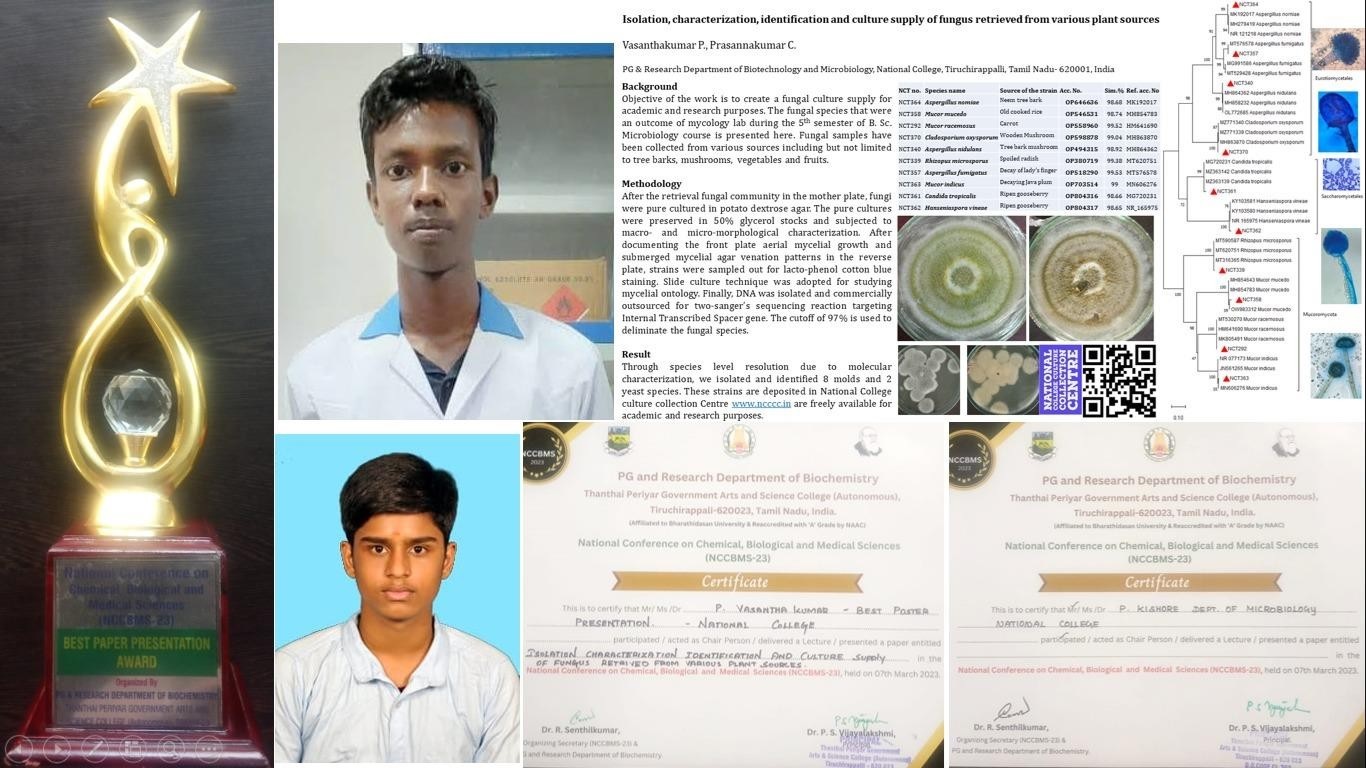
Ms. I. Mahashree of II B. Sc. Microbiology, who is instrumental in expanding and maintaining microbial species of National College Culture Collection Centre (NCCCC, www.ncccc.in), has introduced and presented the NCCCC services at an International conference on "Future Challenges of Microbes in Environment" organized by the PG & Research Department of Microbiology in association with Microbiology Society, held at Jamal Mohamed College, on 23.02.2023, and won third place.
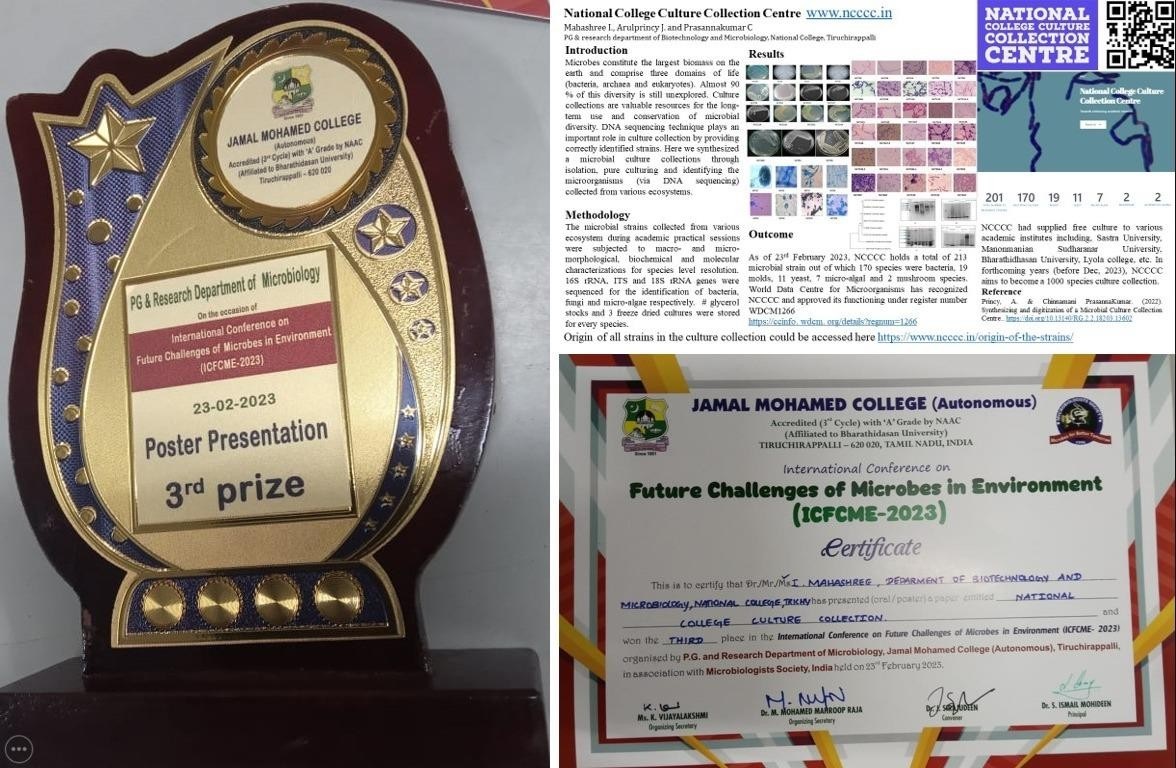
Ms. M. Madhura (III B. Sc. Biotechnology), who is working on archaea, participated and presented her work entitled "Use of polystyrene cans for culturing methanogenic archaeal community" at an International conference on "Future Challenges of Microbes in Environment" organized by the PG & Research Department of Microbiology in association with Microbiology Society, held at Jamal Mohamed College, on 23.02.2023, and won third place.
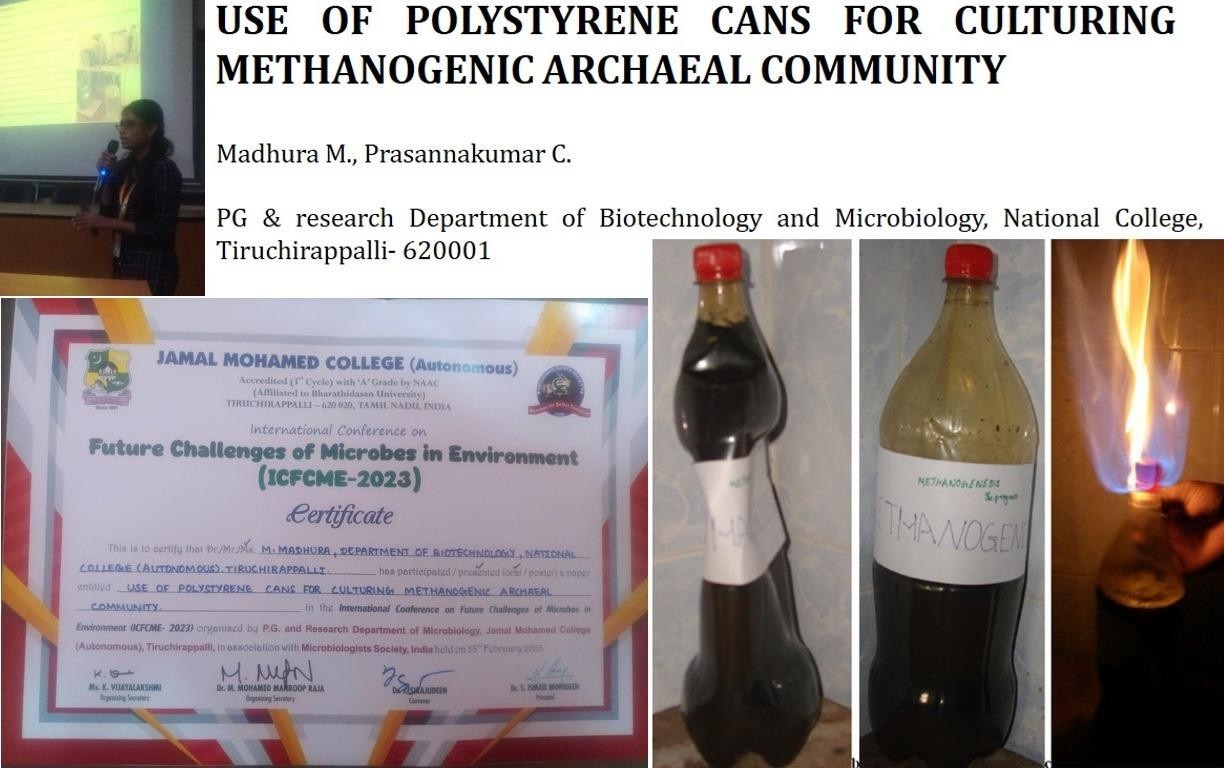
Ms. Sanmathy K of III BSc. Biotechnology participated and won 3rd Prize for poster presentation at the National Seminar on Innovative Research Approaches in Biological Sciences, organized by the PG & Research Department of Botany, Jamal Mohamed College (Autonomous), Tiruchirappalli on 25 & 26 May 2022.
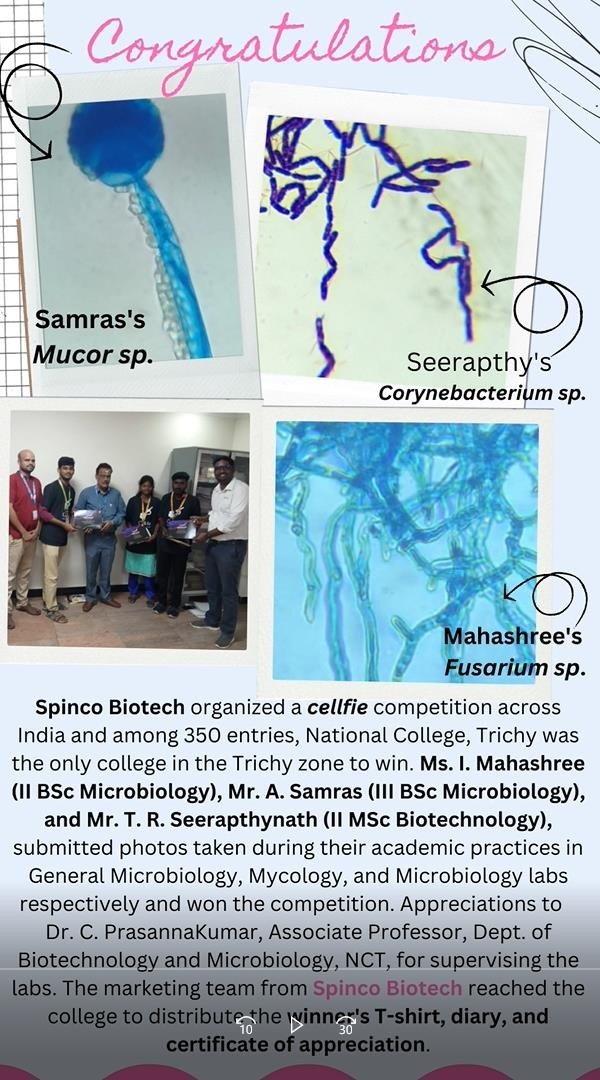
Ms. Sanmathy K of III BSc Biotechnology participated and won 3rd Prize for poster presentation on the National conference on Post COVID-19 complications – A Biotechnological approach (PCBA’22) held in Jamal Mohamed College (Autonomous), Tiruchirappalli on 07 & 08 September 2022.
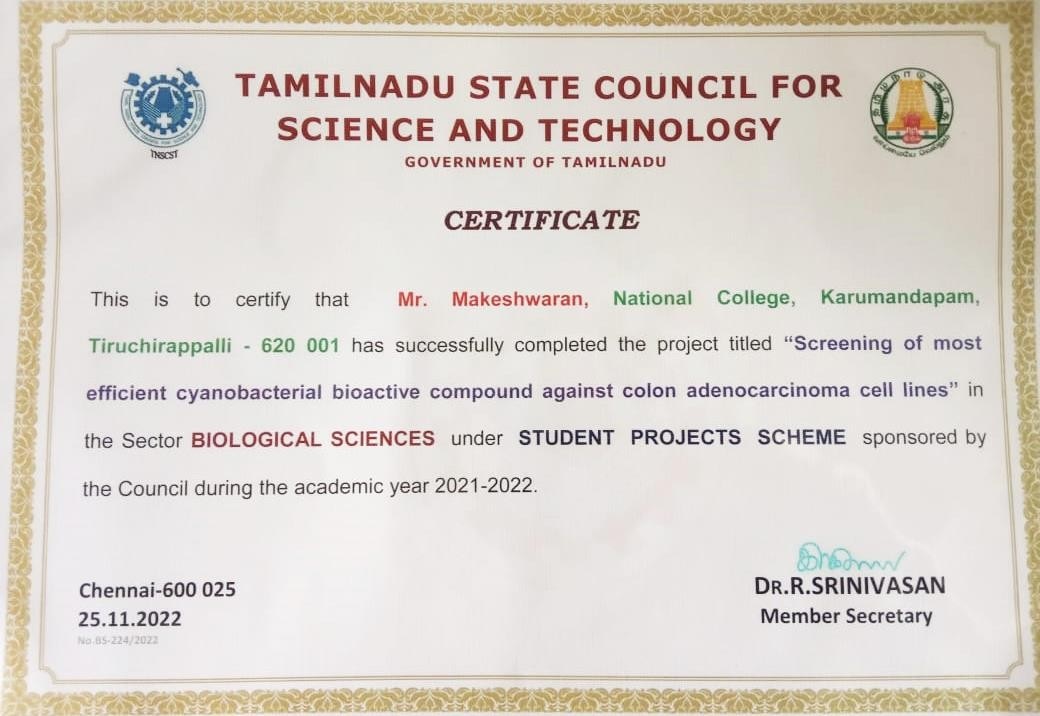
Ms. Sanmathy K, Snagha S and Yogeshwaran G of III BSc Biotechnology participated and won 2nd Prize for Poster Presentation at the National level Technical Symposium Bioritz 2K22 on Conclave for Sustainable Biotechnology held at Anna University, Tiruchirappalli on 22 & 23 September 2022.
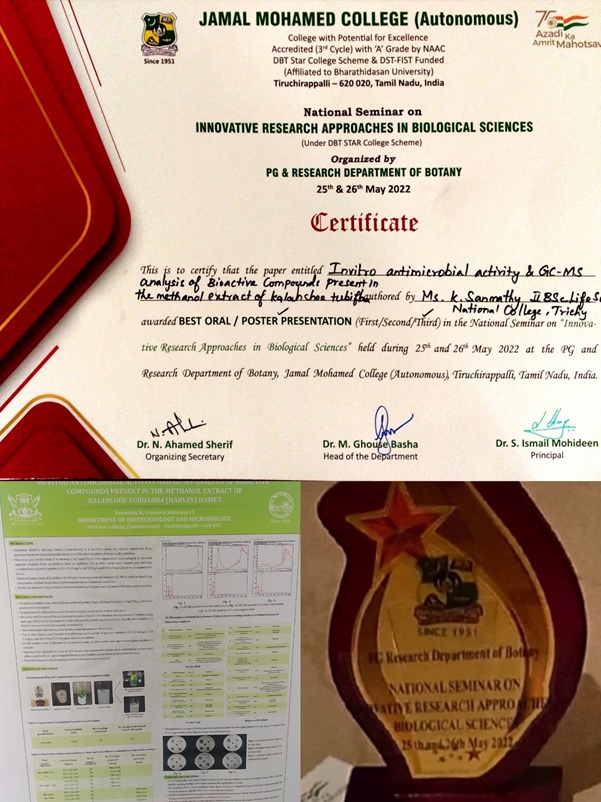
Ms. Sanmathy K, Snagha S of III BSc Biotechnology participated and won Best Presentation Award in the Sci Tech’23 – International Conference on “Integrated Sciences for Sustainable Future” held at Nadar Sarawathi College of Arts & Science, Vadapudhupatti, Theni on 19 & 20 January 2023.
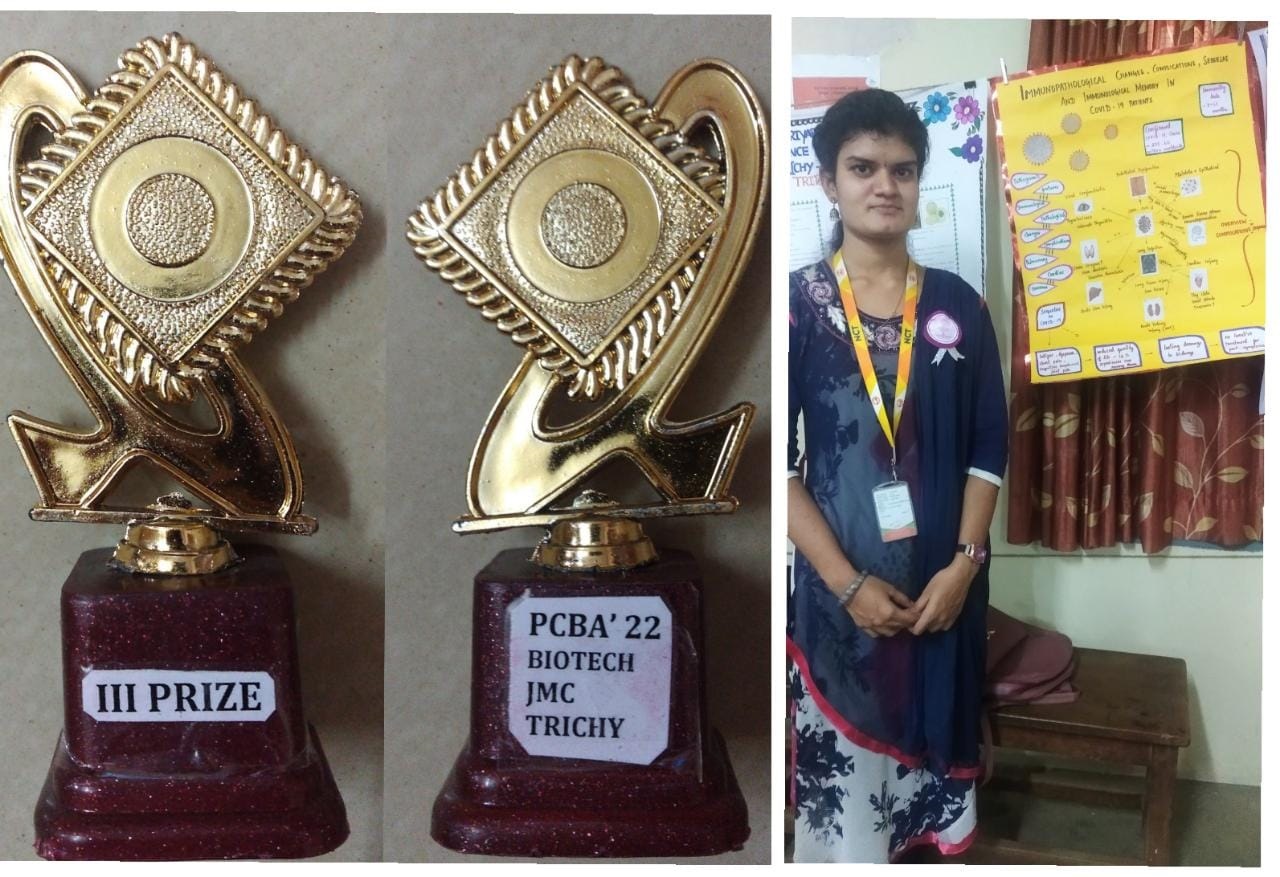
Students recognized for their laboratory proficiency
The microscopy images captured during the students’ laboratory sessions have been awarded the top prizes to Ms. I. Mahashree (III BSc Microbiology), Mr. A. Samras (III Microbiology) and Mr. T. R. Seerapthynath (II MSc Biotechnology), in the state wide 'Best Cellfie Microbial Images' competition hosted by Spinco Biotechnology in Chennai.
Students bagging project funds from Tamil Nadu State Council for Science and Technology
Under the mentorship Dr. C. Prasannakumar, Mr. Mahesh (I M. Sc. Biotechnology) secured student project fund for his proposal submitted entitled “Screening of most efficient cyanobacterial bioactive compound against colon adenocarcinoma cell lines”.
e (III BSc Microbiology), Mr. A. Samras (III Microbiol ogy) and Mr. T. R. Seerapthynath (II MSc Biotechnology).
In 2023, under the mentorship of Dr. C. Prasannakumar, Ms. Nithya (I M. Sc. Biotechnology) have secured student project fund for her proposal submitted entitled “Utilization of sewage derived algal biomass as a substrate for bioethanol production”.
Presentations & Awards secured by Students mentored by Prof. S. Crosswin
Ms. Sanmathy K of III BSc. Biotechnology participated and won 3rd Prize for poster presentation at the National Seminar on Innovative Research Approaches in Biological Sciences, organized by the PG & Research Department of Botany, Jamal Mohamed College (Autonomous), Tiruchirappalli on 25 & 26 May 2022.Ms. Sanmathy K of III BSc. Biotechnology participated and won 3rd Prize for poster presentation at the National Seminar on Innovative Research Approaches in Biological Sciences, organized by the PG & Research Department of Botany, Jamal Mohamed College (Autonomous), Tiruchirappalli on 25 & 26 May 2022.
Ms. Sanmathy K of III BSc Biotechnology participated and won 3rd Prize for poster presentation on the National conference on Post COVID-19 complications – A Biotechnological approach (PCBA’22) held in Jamal Mohamed College (Autonomous), Tiruchirappalli on 07 & 08 September 2022.
Ms. Sanmathy K, Snagha S and Yogeshwaran G of III BSc Biotechnology participated and won 2nd Prize for Poster Presentation at the National level Technical Symposium Bioritz 2K22 on Conclave for Sustainable Biotechnology held at Anna University, Tiruchirappalli on 22 & 23 September 2022.
Ms. Sanmathy K, Snagha S of III BSc Biotechnology participated and won Best Presentation Award in the Sci Tech’23 – International Conference on “Integrated Sciences for Sustainable Future” held at Nadar Sarawathi College of Arts & Science, Vadapudhupatti, Theni on 19 & 20 January 2023
Presentations & Awards secured by Students mentored by Prof.Vaurna K
INTERNATIONAL AWARDS - 05
1. Ms. B. Sivasankari of III BSc Microbiology won Best Poster Presentation Award in the International Conference on Environmental Management and Sustainable Development organized by Holy Cross College, Tiruchirappalli.
2. Mr. I. Nivaskanna and Mr. A. Chithirasenan of III BSc Biotechnology won Best Paper Presentation Award in the International Conference on Recent Trends, Strategies and Technical Advancements in Biological and Biomedical Sciences for Sustainability (RTSTA'22) organized by Seethalakshmi Ramaswamy College, Tiruchirappalli.
3. Ms. P. Ishwarya, Research Scholar, Ms. B. Madhumitha, and Ms. B. Sivasankari of III BSc Microbiology won Best Poster Presentation Award in the International Conference on Recent Trends, Strategies and Technical Advancements in Biological and Biomedical Sciences for Sustainability (RTSTA'22) organized by Seethalakshmi Ramaswamy College, Tiruchirappalli.
4. Mr. I. Nivaskanna and Mr. A. Chithirasenan of III BSc Biotechnology won Best Paper Presentation Award in the 8th International Conference on ‘Recent Advances in Bioscience’ organized by KSG College, Coimbatore.
5. Ms. P. Ishwarya, Research Scholar and Ms. B. Madhumitha of III BSc Microbiology won Best Poster Presentation Award in the International Seminar on Sustainable Development and Natural Resources organized by GTN College, Dindigul.
NATIONAL AWARDS - 06
1. Mr. I. Nivaskanna and Mr. A. Chithirasenan of III BSc Biotechnology won Best Paper Presentation Award in the National Conference on Recent Trends in Biological Sciences organized by GVN College, Kovilpatti.
2. Ms. P. Ishwarya, Research Scholar won Best Poster Presentation Award in the National Conference on Recent Trends in Biological Sciences organized by GVN College, Kovilpatti.
3. Ms. B. Madhumitha of III BSc Microbiology won Best Paper Presentation Award in the National Level Technical Symposium & Aristofest.
4. Mr. I. Nivaskanna and Mr. A. Chithirasenan of III BSc Biotechnology won Best Paper Presentation Award in the National Symposium on ‘Exploring Innovations in Biosciences and Aristo Fest (NSEIB-2022)’ organized by Rathinam College, Coimbatore.
5. Ms. P. Ishwarya, Research Scholar and Ms. B. Sivasankari of III BSc Microbiology won Best Poster Presentation Award in the National Symposium on ‘Exploring Innovations in Biosciences and Aristo Fest (NSEIB-2022)’ organized by Rathinam College, Coimbatore.
6. Ms. P. Ishwarya, Research Scholar won Best Paper Presentation Award in the National Seminar on Recent Trends in Plant Sciences and Atmospheric Physics organized by E.S. College, Villupuram.
Students who enrolled and qualified NPTEL courses, mentored by Prof. K. Varuna
- 1. Mr. I. Nivaskanna, III BSc Biotechnology – Experimental Biotechnology (57%)
- 2. Ms. A. K. Monisha, I BSc Microbiology – Human Molecular Genetics (47%)
- 3. Mr. L. Michael Dissasa, I BSc Biotechnology - Human Molecular Genetics (48%)
- 4. Ms. S. Ranjana, I BSc Biotechnology - Human Molecular Genetics (53%)
- 5. Mr. M. Gokul, I MSc Microbiology - Human Molecular Genetics (45%)
Institute-Industrial Visits
| S.No. | Date | Institute/ Industry | Place |
|---|---|---|---|
| 1 | 10.02.2022I | Tamil Nadu Agriculture University (TNAU) | Trichy |
| 2 | 11.02.2022 | ICAR- National Research Center for Banana (NRCB) | Trichy |
| 3 | 15.02.2022 | National institute of food technology, Entrapreunureship and management (NIFTEM) | Thanjavur |
| 4 | 16.02.2022 | CSIR- Central electrochemical Research institute | Rameswaram |
| 5 | 16.02.2022 | ICAR- Central Marine Fisheries Research Institue | Mandapam |
| 6 | 16.02.2022 | CSIR-CSMCRI Marine Algae Research Station | Mandapam |
| 7 | 05.03.2022 | Kothari Sugars and Chemicals Limited | Kattur, Tiruchirappalli |
| 8 | 24.06.2022 | Banana Grower Federation | Thotiyam, Trichy |
Sequence submission
| S.No. | Names | Bacteria | NCT accession number | Accession number | Technical report |
|---|---|---|---|---|---|
| 1 | Chinmay Nanda | Staphylococcus saprophyticus | NCT110 | ON242104 | https://doi.org/10.13140/RG.2.2.29266.84162 |
| 2 | Eiriene Prasad | Staphylococcus epidermidis | NCT108 | ON241804 | http://dx.doi.org/10.13140/RG.2.2.16986.62404 |
| 3 | S Aparna | Streptococcus mitis | NCT112 | ON243608 | http://dx.doi.org/10.13140/RG.2.2.30408.39685 |
| 4 | Nandakumar | Serratia fonticola | NCT106 | ON242376 |
GAT-B Coaching classes conducted by M.Sc. students
| S.No. | Resource Person | Topic | Date |
|---|---|---|---|
| 1 | Seerapthynath T R and Jithin B | Molecular structure of genes and chromosomes; Mutations and mutagenesis; Nucleic acid replication, transcription, translation and their regulatory mechanisms in prokaryotes and eukaryotes; Mendelian inheritance | 31/03/22 |
| 2 | Nandhakumaar. R and Eiriene Prasad | Gene interaction; Complementation; Linkage, genetics (plasmids, transformation, transduction, conjugation); Horizontal gene transfer and Transposable elements; RNA interference; DNA damage and repair; Chromosomal variation; Molecular basis of genetic diseases. | 01/04/22 |
| 3 | Jagannati Kiran Babu and Chinmay Nanda | History of Immunology; Innate, humoral and cell mediated immunity; Antigen; Antibody structure and function; Molecular basis of antibody diversity; Synthesis of antibody and secretion; Antigen-antibody reaction; Complement | 02/04/22 |
| 4 | Tamalika Manna and Aparna S | Principles of microscopy-light, electron, fluorescent and confocal; Centrifugation- high 02-04-22 & CHINMAY NANDA speed and ultra; Principles of spectroscopy-UV, visible, CD, IR, FTIR, Raman, MS, NMR; Principles of chromatography- ion exchange, gel filtration, hydrophobic interaction, affinity, GC, HPLC, FPLC; Electrophoresis; Microarray | 04/04/22 |
| 5 | Md Tafseer Alam | Primary and secondary lymphoid organ; B and T cells and macrophages; Major histocompatibility complex (MHC); Antigen processing and presentation; Polyclonal and monoclonal antibody; Regulation of immune response; Immune tolerance; Hypersensitivity; Autoimmunity; Graft versus host reaction. | 05/04/22 |
Invited talks on Study abroad
| S.No. | Resource Person | AFFILIATION | TOPIC AND DATE |
|---|---|---|---|
| 1 | Dr. Jatin Sharma | University of Florida | April 9, 2022 |
| 2 | Dr. Kamraj Sathish KumarDr. Kamraj Sathish Kumar | Technológico National de México | April 14, 2022 |
| 3 | Dr. Sindhujaa Vajravel | Uppsala University Sweden | April 19, 2022 |
| 4 | Dr. Sripriya Nannu Shankar | University of Florida | May 3, 2022 |
Invited talks on Study abroad
| S.No. | Name of the student | Institute |
|---|---|---|
| 1 | Rehan | ICMR- RMRC Dibrugarh. 6-months summer training during pandemic. THSTI –Clinical immunology core lab. |
| 2 | Gauspasha | Completed six months internship in ICMR-RMRC Dibrugarh, Assam |
| 3 | Akshaya R | Department of Animal Health & Management, Alagappa University,Karaikudi. |
| 4 | Prachi Sathish Vibhute | Kothari Research and Development, HCK Group, (IIT Madras Research Park, Chennai) As Research Institute |
| 5 | Yashika Pusam | Department of Animal Health & Management, Alagappa University,Karaikudi. |
| 6 | Ramakant Mohite | CSIR- Central Drug Research Institute, Lucknow |
| 7 | Mohit | CSIR- Central Drug Research Institute, Lucknow. |
| 8 | Anirudh | Regional Centre for Biotechnology Faridabad. |
| 9 | Imran | Kothari Research and Development, HCK Group, (IIT Madras Research Park, Chennai) As Research Institute |
| 10 | Sriramakrishnan E | POST HARVESTING LABORATORY SATHYABAMA UNIVERSITY CHENNAI |
| 11 | Vishali S P R | MOLECULAR TOXICOLOGY LABORATORY BHARATHIYAR UNIVERSITY COIMBATORE |
| 12 | Rahul.M | Doctors diagnostic centre Doctors diagnostic centre Doctors diagnostic centre near woraiyur; Trichy |
| 13 | Aarti Muralitharan | Behavioral Neurogenetics Laboratory JNCASR, Bengaluru Bengaluru |
| 14 | Ashok Sankar | Bioprocessing lab R&D Fermentech GSV Pvt Industry Tiruchirapalli |
| 15 | N.Tamil Arasan | Bioprocess FERMENTECH GSV Private limited Thanjavur |
| 16 | Mohammedbasha M | Post harvesting Laboratory, Centre for Ocean Research. Sathyabama University Chennai |
| 17 | Nithya K V | Post harvesting lab, center for ocean research sathyabama institute of Science and Technology hennai |
| 18 | Vithiya S | Post harvesting lab, center for ocean research Sathyabama institute of Science and Technology Chennai |
| 19 | Sakshee Vijay Dubal | Marine Biomedical research & environmental toxicology unit Saveetha Dental College Chennai |
| 20 | Seerapthynath T R | Department of Microbiology Pondicherry University Puducherry |
| 21 | B Jithin | Molecular Cancer Biology Lab Alagappa University Karaikudi |
| 22 | Nandhakumaar R | DEPARTMENT OF Microbiology Pondicherry University Puducherry |
| 23 | Eiriene Prasad | Department of Molecular Epidemiology ICMR- VECTOR CONTROL RESEARCH CENTRE Pondicherry |
| 24 | J Kiran Babu | ICMR: VCRC Field Station Organization Kottayam |
| 25 | Chinmay Nanda | Molecular Cancer Biology Lab Alagappa University, Karaikudi Sivagangai |
| 26 | Tamalika Manna | Ocean toxicological, Sathyabama University Chennai |
| 27 | S Aparna | Department of omics, ICMR- Vector Control Research Centre Pondicherry |
| 28 | MD Tafseer Alam | ICMR-VCRC, Pondicherry |
| 29 | Shuaib Saquib K | Ingex Lab private limited, Bangalore, Karnataka |
ADMISSION PROCEDURE
Admission Procedure
INTERNATIONAL STUDENTS
International Students
International Students can apply for B.Sc Biotechnology / B.Sc Microbiology / B.Sc Bioinformatics or M.Sc Biotechnology/ Microbiology through online applications.
Additionally, International applicants are adviced to contact Dr. M.S. Mohamed Jaabir through email (mohamedjaabir@nct.ac.in) or whats app (+91 9786425226)
MOU
MOU
The Department of Biotechnology and Microbiology has signed MoU’s with many academic and industrial organizations of National and International repute. The list is not limited to:
| S.No. | MoU Signed with institute/industries | Date of MoU Signing | Activities undertaken |
|---|---|---|---|
| 1 | ICAR-National Research Centre for Banana, Tiruchirappalli | 26.04.2021 | BSc / MSc Biotechnology/Microbiology Industrial visit and Training Program for Tissue Culture and Banana cultivation and Post Harvesting Technology |
| 2 | Department of Animal Health And Management, Alagappa University, Karaikudi | 26.04.2021 | Ms. Yashika, Ms. Akshaya II MSc Biotechnology (2022) Worked for their PG Project in collaboration with the Dept |
| 3 | Kothari sugars and Chemicals Limited, Tiruchirappalli | 29.04.2021 | Mr. Imran Ahmed and Ms. Prachi, II MSc Biotechnology(2021-22) carried out their collaborative project (of Kothari Sugars) at IIT, Chennai. UG/PG students were taken for Industrial Visits |
| 4 | Targenix Private Limited, Chennai | 09.07.2021 | Internship Training was organized at Targenix.Mr. Karthik, Mr. Balaji, Mr. Abraham, III BSc Microbiology Internship. |
| 5 | Vivagendx Labs, Velachery, Chennai | 05.10.2021 | Internship training and Invited Talk were organized |
| 6 | Experteze | 27.12.2021 | Three of our MSc Biotechnology students Mr. Basha, Ms. Vidhya and Ms. Nithya were sanctioned (online) with projects and awaiting funding |
| 7 | Fermentech GSV Private Limited, Thanjavur | 28.12.2021 | Industrial visit to the Industry was organized.Mr. Tamil and Mr. Ashok Sankar, II MSc Biotechnology were engaged for Internship training and executing PG Project. |
| 8 | Aarupadai Veedu Medical College, Vinayaka Missions Research Foundation- Deemed to be University, Puducherry. | 10.11.2022 | Dr. G. Rohini, Associate Professor, Dept. of Biotechnology, & Microbiology, National College (Autonomous), Trichy, collaborates for research with the Institute |
| 9 | Dhanajeevam Lifesciences, Coimbatore | 18.11.2022 | Internship Training for students in Plant Tissue Culture Techniques |
| 10 | Global Nature Foundation, Thuraiyur | 01.12.2022 | Field Visits and Eco Tour to Naveen’s Garden. |
| 11 | Trichy SRM Institute of Medical Sciences and Research Centre | 03.02.2023 | Research Collaboration |
| 12 | Prabhu Diabetes Multi-Speciality Centre | 06.04.2023 | Research Collaboration |
PLACEMENT
PLACEMENT
Apart from the campus drive with profession relevant to Biotechnology and Microbiology, our students find employment through references from their mentors in the department and alumni, who are in alignment with the relevant industries.
Biotechnology or Microbiology, both are highly interdisciplinary and requires ability to work with people from wider background such as biology, chemistry, microbiology, molecular biology, immunology, genetics, engineering, food science, agriculture, animal science etc. Some of the fields where students get absorbed are as follow:
Medicine & health care:
- Clinical Embryology as Junior / Senior Embryologists
- Clinical Research as CRO
- Biopharma Production and Analysis
- Molecular Diagnostics
Research & Development:
Students get placed in both the Government and the Private organizations who employ biotechnologists / microbiologists playing crucial role in research and development, for increasing productivity, improving energy production and conservation, minimizing pollution and industrial waste etc.
Agriculture & animal husbandry
There are tremendous opportunities in the field of Agriculture finding application in the areas of improvement in the quality of seeds, insecticides and fertilizers. Students also find placements in the organizations that employ latest technologies like micro-propagation and tissue preparation of biofertilizers and bioinsecticides.
Graduates with a flair to rear animals, find opportunities in establishing farms for its commercial value. Students are given professional training during their tenure, so that it will enable them to practice cuniculture, vermiculture and / or apiculture.
Environment
Students are also observed in organizations that serve other industries to manage with their pollution management and in the process of obtaining environmental clearance. In this area, the job of a biotechnologist or a microbiologists ranges from studying industrial pollution levels, better conservation of ecosystem, treatment of industrial waste to recycling of those
Higher Education / To Pursue Ph.D.
Those who aspire to take up research as career find their goals through intensive preparations and practice. Students who engaged themselves in serious research projects and who manage to publish their findings or who write-up chapters on the trending areas in advanced biology find their place in suitable research projects in many funded research projects in govt. and non-governmental organizations to pursue PhD.Beside all this, skilled graduates from our department find great scope in research laboratories as research associates or fellow based on their individual interests, experience and calibre.
INDIVIDUAL-BASED TRAINING / INTERNSHIP
Students of both UG / PG are invited from other departments and institutions to learn the techniques / Instrumentation on short term training and internship programs. Certificates will also be issued pertaining to the training undergone. Students are also free to propose new projects or collaborate in the research programs / projects being undertaken in the department with the prior approval from the faculty concerned. For this, students may use the google form given below to apply for the training / internships.
CONSULTANCY SERVICES
The Department of Biotechnology and Microbiology houses some of the exclusive facilities in the areas of Animal Cell Culture, Microbiology and Bioprocess Technology. With this, consultancy works for students / scholars / researchers from other organizations are being undertaken on request. Some of the analysis that are undertaken are not limited to the following:
- In vitro toxicity studies in Cell lines - MTT (cytotoxicity / cell viability assay)
- Reactive Oxygen Species (ROS Assay) by flow cytometry
- Cell Cycle assay by flow cytometry
- Apoptosis Assay by flow cytometry
- Fluorescent studies for investigations pertaining to anti-cancer activities.
- Lyophilization
- Anti-microbial assays
- Molecular Docking
Contact via email or the google form given below:
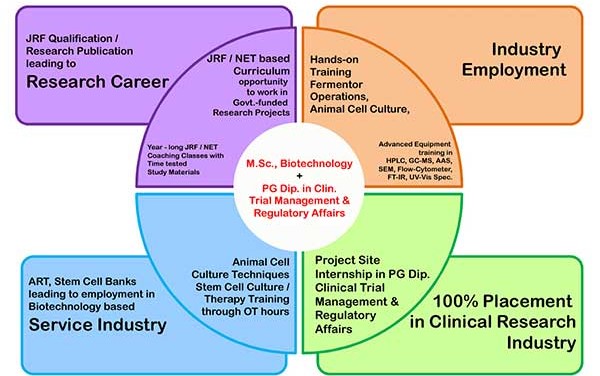
FACILITIES
Facilities
The Department has excellent facilities for teaching and research in Modern Biology and Biotechnology, namely, Animal Cell Culture, Plant Tissue Culture, Fermentation technology, Microbiology, Immunology, Environmental Biotechnology, Bioinformatics and Genetic Engineering.
The department houses every facility for the teaching and learning of Biotechnology from PG level up to research level with an exclusive National College Instrumentation Facility (NCIF) which is equipped with Scanning Electron Microscope (SEM), High Performance Liquid Chromatography (HPLC), Atomic Absorption Spectroscopy (AAS), Gas Chromatography-Mass Spectrophotometer (GC-MS), FT-Infra Red Spectrophotometer and Fluorescent Spectrophotometer.
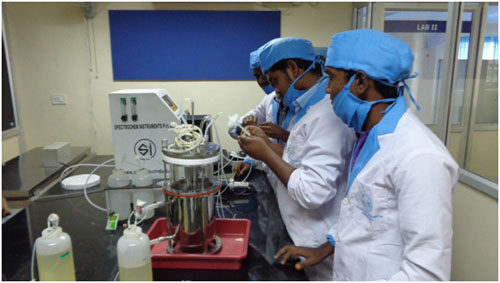 Besides, the faculty engage actively in research and are in process of equipping the Laboratory further through research grants. Over the past few years, Crores of rupees have been obtained as grant from DBT, MoES, DST, SERB, UGC and TNSCST. The laboratory is virtually open on all days through 24 hours to enable immersive and intensive laboratory training / research. That’s why, the facility is an exclusive place for Biotechnology / Microbiology
Besides, the faculty engage actively in research and are in process of equipping the Laboratory further through research grants. Over the past few years, Crores of rupees have been obtained as grant from DBT, MoES, DST, SERB, UGC and TNSCST. The laboratory is virtually open on all days through 24 hours to enable immersive and intensive laboratory training / research. That’s why, the facility is an exclusive place for Biotechnology / Microbiology
The Fermentation Facility of the Department has wider range of Bioreactors such as Stirred-Tank / Photo-Bioreactor / Air-lift / Fluidized Bed Reactors.
Major Facilities On Our Campus
- Class 1000 Cleanroom Facility for Animal / Mammalian Cell Culture
- Microbial Collection & Culture facility
- Molecular Biology Facility
- Animal House facility
- Aquatic Biotechnology facility
- Mycology facility
- Bioprocess & Downstream Facility
- Bio-informatics facility
- DNA Barcoding facility
- Nano-biotechnology facility
- National College Instrumentation Facility(NCIF)
- Plant Tissue and Algal Culture facility
- Environmental Biotechnology Facility
- Geobiotechnology Facility
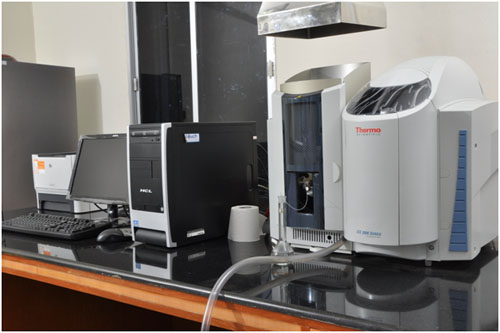
Atomic Absorption Spectroscopy (AAS) at NCIF
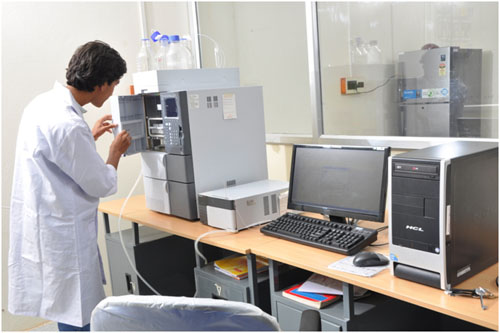
High Performance Liquid Chromatography (HPLC) at NCIF
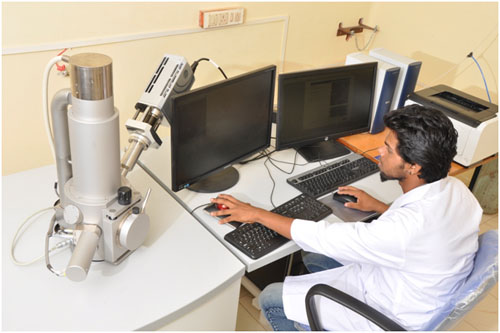
Scanning Electron Microscope (SEM) at NCIF
List of Major Equipment available for Biotechnology Programme
- Scanning Electron Microscope (Tescan - NCIF)
- FT- Infra Red Spectrophotometer (Perkin-Elmer – NCIF)
- CO2 Incubators (Eppendorf)
- Flow cytometer (BD Biosciences)
- Gas Chromatograpy – Mass Spectrophotometer (Bruker)
- Gel Documentation System (BioRad)
- Laminar Air flow hoods (#6)
- Luminometer
- BOD Analyzer (Digital)
- Water quality analysis system
- Variable volume micropipettes – Single Channel & Multi-channel system
- UV illumination chamber for chromatogram
- Gel Electrophoresis Apparatus (Protein / DNA)
- UPS (20 KVA) with Battery Back-up
- UV Transilluminator
- Gradient PCR
- HPTLC Documentation System
- Thermal Gravimetric Analyzer
- Fluorescent Spectrophotometer (Shimadzu - NCIF)
- Atomic Absorption Spectrophotometer (Thermo - NCIF)
- Deep Freezer (-80C)
- ELISA Reader
- Bioreactors (Stirred-Tank/ Air-lift/ Photo-bioteactor/ Fluidized-Bed Reactors)
- HPLC system (Shimadzu)
- Biosafety Class III Cabinet
- Lyophilizer
- COD Analyzer (Digital)
- Western Blotting system
- Microscopes: Straight and Inverted with Camera & Imaging system
- PCR Thermal Cycler (Eppendorf)
- Refrigerated High Speed Centrifuges
- UV-Visible Double beam Spectrophotometers
- Water filtration system (Millipore)
- Anaerobic Work Station
- Particle Size Analyzer
- Single Crystal X-Ray Crystallography
RESEARCH PROJECTS
Research Projects
Department of Biotechnology (DBT-India)
Program Co-ordinator Dr. M.S. Mohamed Jaabir
Program: DBT PG Teaching Scheme
Sanctioned Amount: Rs. 130,00,000/-
Duration : 5 Years
Purpose: To Strengthen Curriculum and Laboratory Facility in UG
Department of Biotechnology (DBT-India)
Program Co-ordinator Dr. M.S. Mohamed Jaabir
Program: DBT STAR College Scheme
Sanctioned Amount: Rs. 104,00,000/-
Duration : 5 Years
Purpose: To Strengthen Curriculum and Laboratory Facility in UG
Science and Engineering Research Board, New Delhi
Principal Investigator: Dr. M.S. Mohamed Jaabir
Project Title: STUDY ON THE ANTI-CANCER PROSPECTS OF THE COELOMIC FLUID OF EATHWORM
Sanctioned Amount: Rs. 34,00,000/-
Duration : 3 Years
Ministry of Earth Sciences (MoES), Govt. of India, New Delhi.
Principal Investigator: Dr. S. Senthil Kumar (Co-PI)
Project Title:Geobiotechnological study of late Pleistocene and Holocene sea-level changes along the coast of Tamil Nadu using geomorphological and microbiological indicators.
Sanctioned Amount: Rs. 45,00,000/-
Duration : 2 Years
University Grants Commission (UGC), New Delhi , India.
Principal Investigator: Dr. S. Senthil Kumar
Project Title: Strategic Approach to Re-use Biologically degraded and Photo-catalytically treated Textile Waste Water for Crop Irrigation to encourage Water Use Efficiency in the Textile Valley of Tamil Nadu
Sanctioned Amount: Rs. 13,85,000/-
University Grants Commission (UGC), New Delhi , India.
Principal Investigator: Dr. M.S. Mohamed Jaabir
Project Title: A Molecular investigation on the onset of Attention Deficit Hyperactivity Disorder (ADHD) in the maternal micronutrient deficient offspring
Sanctioned Amount: Rs. 15,86,000/-
SERB, New Delhi, funded Major Project under Young Scientist Scheme
Principal Investigator: Dr. S. Senthil Kumar
Project Title: Advanced Oxidation process and microbial treatment for toxicity-free Effluent disposal.
Sanctioned Amount: Rs. 25,00,000/-
Status: On-going.
TNSCST, Chennai, funded Project
Principal Investigator: Dr. S. Senthil Kumar
Project Title: Biorestoration of Textile Effluent-polluted Soil for Tirupur Region through Vermistabilization and subsequent evaluation of Crop Plants.
Fellow ship: 1 (One)
Name of the Research Scholar: M. Muruganandham
Sanctioned Amount: Rs. 2,69,000/-
Status: On-going.
UGC’s Funded PG Diploma Programme under the ‘Innovative Scheme
Programme Offered: Post Graduate Diploma in Bioprocess Technology
Sanctioned Amount: Rs. 60,00,000/-
Programme Co-ordinator: Dr. M.S. Mohamed Jaabir
Faculty Position under the Scheme: Three (3)
Maximum number of students alloted: 15
UGC’s Minor Research Project
Principal Investigator: Dr. S. Senthil Kumar
Project Title: Strategic approach for the Treatment of textile wastewater and its re-use in agriculture to reduce the demand-supply gap on water in the textile valley of Tamil Nadu.
Sanctioned Amount: Rs. 2,60,000/-
Status: On-going
UGC’s Minor Research Project
Principal Investigator: Dr. M. S. Mohamed Jaabir
Project Title: Study on the anti-cancer activity of coelomic fluid of earthworm in cancer cell line.
Sanctioned Amount: Rs. 3,40,000/-
Status: On-going.
STUDENT REFERENCE
Student Reference
Digital Format References
Department of Biotechnology holds more than 300 volumes of books and audio-visuals in digital format. Any student of National College (Autonomous), Trichy may borrow the e-book in a CD form from the collection and carry it to their places for use.
Titles are available in fundamentals of Microbiology, Biochemistry, Immunology and other subjects
Web Resources
| Wikipedia Page | http://en.wikipedia.org/wiki/Biotechnology |
| Dept of Biotechnology - Ministry of Science & Technology, GOI | http://dbtindia.nic.in/index.asp |
| Directory of Open Access Journals | http://www.doaj.org/doaj?cpid=77&func=subject |
| Nature Publishing Group | http://www.nature.com/biotech/index.html |
| Biotechnology in Europe | http://www.biotechnology-europe.com/ |
| Science Daily | http://www.sciencedaily.com/articles/plants_animals/biotechnology/ |
| Fierce Biotech - Industry Daily Monitor | http://www.fiercebiotech.com/ |
| Scientific American | http://www.scientificamerican.com/biotechnology |
| Natural News | http://www.naturalnews.com/biotechnology.html |
| Biology Online | http://www.biology-online.org/kb/biology_articles/biotechnology.html |
| Bio Med Central | http://www.biomedcentral.com/bmcbiotechnol/content |
Recommended Books
- Introduction to Biotechnology (2nd Edition) - Biotechnology for Beginners by Reinhard Renneberg and Arnold L. Demain
- Principles of Biochemisty by Lehninger A.L, Nelson D.L and Cox M.M. (2003)., Worth publishers, New York.
- An Introduction to Genetic Analysis by Griffiths A. J, Miller J. H, Suzuki D. T, Lewontin R. C and Gelbart W. M. (2000). W. H. Freeman and company.
- Principles of Genetics by Snustad D. P, Simmons M.J and Jenkins J.B. (1997). John Wiley and sons.
- Molecular Biology of Gene by Watson J.D, Hopokins, N.H.Roberts J.W, Steitz J.A and Weiner A.M. (2004)., Benjamin / Cummings Publishing company.
- Microbiology – An Introduction by Tortora, Funke and Case. (1995). Benjamin-Cummings Publications.
- Molecular Cloning by Sambrook J and Russell D. W. (2001). Cold Spring Harbour Lab. Press.
- Immunology by Kuby J, Cameron J, Todd C and Mitchell J. (2000). W.H. Freeman and Co.
- Biotechnology: Proteins to PCR: A Course in Strategies and Lab Techniques by David W. Burden and Donald B. Whitney1
- Molecular Biotechnology- Principles and applications of recombinant DNA technology by Bernard R. Glick and Jack J. Pasternak. (2001). ASM Press, Washington DC
STUDENTS SAY
Students Say












SYLLABUS
UG & PG Programmes
DBT-M.Sc Biotechnology & Microbiology




